new posts in all blogs
Viewing Blog: Betsy Devany's Blog, Most Recent at Top
Results 1 - 25 of 44

My thoughts on writing, attending conferences and writing workshops, accompanied by the photos I take. Also stories from the toy store where I work, and other sources of inspirations, including growing up with a writer. Free Fall Friday writing prompts.
Statistics for Betsy Devany's Blog
Number of Readers that added this blog to their MyJacketFlap: 1
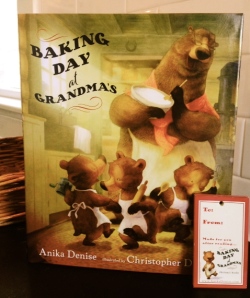 Baking Day at Grandma’s is a picture book bundled in love, warmth, and thoughtfulness. At its core, it speaks to a family (grandma and her grand cubs) spending quality time together. Not only is Anika Denise’s text a pitch-perfect rhyme—and one that makes you want to clap along (and bake a cake) with the charming bears—Christopher Denise’s illustrations are enchanting. The cover, with light streaming in through the kitchen window, immediately pulls you into the scene. You want to join the bear family, stir batter, sip hot cocoa on a snowy day, and dance to an old-fashioned record player while chocolate cake bakes, all in the company of a loving and adoring grandma bear, who happens to be modeled after Anika’s grandmother Rose. This is the highlight for me, and why Baking Day at Grandma’s is quickly becoming a favorite with my grandkids. The book even includes a recipe for Grandma Rose’s chocolate cake!
Baking Day at Grandma’s is a picture book bundled in love, warmth, and thoughtfulness. At its core, it speaks to a family (grandma and her grand cubs) spending quality time together. Not only is Anika Denise’s text a pitch-perfect rhyme—and one that makes you want to clap along (and bake a cake) with the charming bears—Christopher Denise’s illustrations are enchanting. The cover, with light streaming in through the kitchen window, immediately pulls you into the scene. You want to join the bear family, stir batter, sip hot cocoa on a snowy day, and dance to an old-fashioned record player while chocolate cake bakes, all in the company of a loving and adoring grandma bear, who happens to be modeled after Anika’s grandmother Rose. This is the highlight for me, and why Baking Day at Grandma’s is quickly becoming a favorite with my grandkids. The book even includes a recipe for Grandma Rose’s chocolate cake!
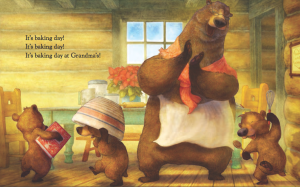 I get emotional over heartfelt picture books, and Baking Day at Grandma’s is one of those books. It’s a perfect text-to-illustration match. The singsong rhythm of Anika’s words, coupled with bears that take on humanlike qualities in their movement and expressions, make this a picture book winner. A true talent of NYT’s bestselling illustrator Christopher Denise is how he brings woodland animals to life. They almost feel real. Clearly, these bears adore each other, and the artwork of their hellos and goodbyes is especially heartwarming. To learn more about how Baking Day at Grandma’s evolved, watch this endearing book trailer. https://www.youtube.com/watch?v=aZTRFELt9-0 Anika also offers a little Activity Kit on her website. Download for free here: http://www.anikadenise.com/free-goodies/
I get emotional over heartfelt picture books, and Baking Day at Grandma’s is one of those books. It’s a perfect text-to-illustration match. The singsong rhythm of Anika’s words, coupled with bears that take on humanlike qualities in their movement and expressions, make this a picture book winner. A true talent of NYT’s bestselling illustrator Christopher Denise is how he brings woodland animals to life. They almost feel real. Clearly, these bears adore each other, and the artwork of their hellos and goodbyes is especially heartwarming. To learn more about how Baking Day at Grandma’s evolved, watch this endearing book trailer. https://www.youtube.com/watch?v=aZTRFELt9-0 Anika also offers a little Activity Kit on her website. Download for free here: http://www.anikadenise.com/free-goodies/
 The Providence Journal recently featured Anika and Christopher in a lovely must-read article. Learn more about this talented duo by clicking on the link. http://www.providencejournal.com/writers/gail-ciampa/20141001-charming-book-by-barrington-couple-has-its-heart-in-the-kitchen.ece
The Providence Journal recently featured Anika and Christopher in a lovely must-read article. Learn more about this talented duo by clicking on the link. http://www.providencejournal.com/writers/gail-ciampa/20141001-charming-book-by-barrington-couple-has-its-heart-in-the-kitchen.ece
 As someone who works at an old-fashioned toy store, I see a lot of grandparents. Too often, they arrive at Mystic’s Toy Soldier clutching detailed Christmas or Hanukkah lists, the I-only-want-this-specific-electronic-toy/game kind of list. I see the frustration and stress that comes along with this. Ultimately, we have lost the true meaning of holidays. Long lists of electronic games only encourage further isolation, and that is not what kids need. They need one-on-one attention. They need the TV off, electronic devices put away in drawers, and they need present adults without a cell phone at the ready. Children need to bake cakes and dance in the kitchen with their grandmas, or with their mothers, their fathers, and their grandfathers. With the support and encouragement of loved ones, children also need to know they can make a difference in this world by doing things for others. In Baking Day at Grandma’s, the bear cubs wrap up individual pieces of cake to give away as gifts. They do get to lick batter off the wooden spoon, which is always been my favorite part of cake baking.
As someone who works at an old-fashioned toy store, I see a lot of grandparents. Too often, they arrive at Mystic’s Toy Soldier clutching detailed Christmas or Hanukkah lists, the I-only-want-this-specific-electronic-toy/game kind of list. I see the frustration and stress that comes along with this. Ultimately, we have lost the true meaning of holidays. Long lists of electronic games only encourage further isolation, and that is not what kids need. They need one-on-one attention. They need the TV off, electronic devices put away in drawers, and they need present adults without a cell phone at the ready. Children need to bake cakes and dance in the kitchen with their grandmas, or with their mothers, their fathers, and their grandfathers. With the support and encouragement of loved ones, children also need to know they can make a difference in this world by doing things for others. In Baking Day at Grandma’s, the bear cubs wrap up individual pieces of cake to give away as gifts. They do get to lick batter off the wooden spoon, which is always been my favorite part of cake baking.
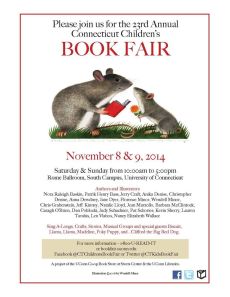 Anika and Christopher Denise are some of the nicest people I know. And this weekend, at the Connecticut Children’s Book Fair, you can meet both of them! In addition to giving a joint presentation, Anika and Chris will also be signing copies of their collaborated books, which include Pigs Love Potatoes, and Bella and Stella Come Home. I could go on and on about why I love these books, too. In addition, Christopher has illustrated a multitude of books by other authors, including Rosemary Wells, and Brian Jacques.
Anika and Christopher Denise are some of the nicest people I know. And this weekend, at the Connecticut Children’s Book Fair, you can meet both of them! In addition to giving a joint presentation, Anika and Chris will also be signing copies of their collaborated books, which include Pigs Love Potatoes, and Bella and Stella Come Home. I could go on and on about why I love these books, too. In addition, Christopher has illustrated a multitude of books by other authors, including Rosemary Wells, and Brian Jacques.
If you are unable to attend this weekend’s Connecticut Book Fair, you can still get a signed copy by contacting Barrington Books, a fabulous independent bookstore in the town where Anika and Christopher live.
Want to win a signed copy of Baking Day at Grandma’s? To enter the drawing, please comment on this post and share your favorite memory of quality time with either your grandchildren or your grandmother. The drawing will be held on Tuesday, November 11. In addition to a signed copy of Baking Day at Grandma’s, the winner will also receive eight baking day gift tags!
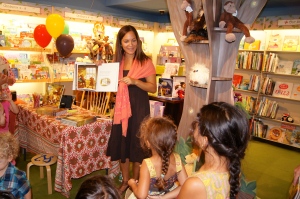



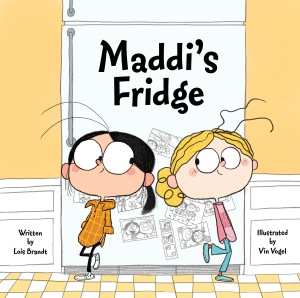 Typically, I do not enter contests, but a few months ago, an online promotion for Maddi’s Fridge caught my attention. Lois Brandt’s new picture book, illustrated by Vin Vogel, seemed exactly the kind of story I wanted to share with elementary kids, with my grandchildren, and also with our local libraries. As a weekly volunteer in a second-grade classroom, I read a picture book of my choice following snack time. I see firsthand how picture books are effectively used with second graders. The kids study characterization, plot, motive, and then compare their own feelings and experiences to a story. Yes, seven- and eight-year-olds need picture books, longer picture books, even though they read independently by this age.
Typically, I do not enter contests, but a few months ago, an online promotion for Maddi’s Fridge caught my attention. Lois Brandt’s new picture book, illustrated by Vin Vogel, seemed exactly the kind of story I wanted to share with elementary kids, with my grandchildren, and also with our local libraries. As a weekly volunteer in a second-grade classroom, I read a picture book of my choice following snack time. I see firsthand how picture books are effectively used with second graders. The kids study characterization, plot, motive, and then compare their own feelings and experiences to a story. Yes, seven- and eight-year-olds need picture books, longer picture books, even though they read independently by this age.
So I commented on the post, then added the title to my ongoing list of books coming out that I wanted to read/buy.
A month later, I received an email: Congratulations! You have won a copy of Maddi’s Fridge! I’d forgotten that I’d evened entered. When the picture book arrived at my house, I was compelled to blog about it.
 While this is an issue book, Lois weaves a non-didactic story, with emphasis on story. She cleverly introduces Maddi and Sofia as two close friends before leading us to what drives the plot: Maddi’s home situation. Maddi is a confident and exuberant child, skilled at climbing walls, while the empathic Sofia struggles with climbing, with Maddi always encouraging Sofia to try harder. The status of Maddi’s refrigerator—it’s empty except for milk she is saving for her brother—is introduced in an organic way. Not only does this story effectively address childhood hunger, it touches on friendship, secrets, and how a child struggles with choosing which secrets need to be shared with an adult, Sofia’s mother in this case. Though at first, Sofia attempts to help (feed) Maddi without revealing her secret in ways that are both touching and funny. The humor element is this kind of story is vital, and Lois is adept at understanding how serious subjects must be infused with sprinkles of humor. Vin Vogel’s illustrations support this to a fully satisfying end. At the story’s close, there are suggestions for kids to “ . . . help friends who have empty refrigerators.”
While this is an issue book, Lois weaves a non-didactic story, with emphasis on story. She cleverly introduces Maddi and Sofia as two close friends before leading us to what drives the plot: Maddi’s home situation. Maddi is a confident and exuberant child, skilled at climbing walls, while the empathic Sofia struggles with climbing, with Maddi always encouraging Sofia to try harder. The status of Maddi’s refrigerator—it’s empty except for milk she is saving for her brother—is introduced in an organic way. Not only does this story effectively address childhood hunger, it touches on friendship, secrets, and how a child struggles with choosing which secrets need to be shared with an adult, Sofia’s mother in this case. Though at first, Sofia attempts to help (feed) Maddi without revealing her secret in ways that are both touching and funny. The humor element is this kind of story is vital, and Lois is adept at understanding how serious subjects must be infused with sprinkles of humor. Vin Vogel’s illustrations support this to a fully satisfying end. At the story’s close, there are suggestions for kids to “ . . . help friends who have empty refrigerators.”
 Vin Vogel’s illustrations are charming. I especially love the background neighborhood, depicted at different times during the day. Overall, the reader feels a sense of family nestled within a cultural community that supports an indie bookstore, yoga studio, and a small-town grocery store, all set against the backdrop of the city. Vin’s own neighborhood, shown in the photograph, inspired Maddi and Sofia’s world.
Vin Vogel’s illustrations are charming. I especially love the background neighborhood, depicted at different times during the day. Overall, the reader feels a sense of family nestled within a cultural community that supports an indie bookstore, yoga studio, and a small-town grocery store, all set against the backdrop of the city. Vin’s own neighborhood, shown in the photograph, inspired Maddi and Sofia’s world.
Published by Flashlight Press, Maddi’s Fridge is an important and memorable picture book. The more children exposed to this story, the better off our world could be. With the back-of-the-book suggestions on how to make a difference, my hope is that Maddi’s Fridge will empower children (and adults) to actively aid in the fight against childhood hunger. 10% of the profits are being donated to help fight the cause.


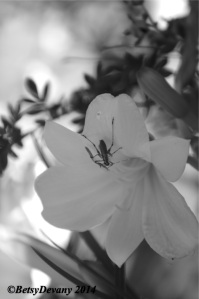 When I struggle with putting words
When I struggle with putting words
to the page,
I step outside,
breathe in fresh air,
then search
for tiny miracles.
In truth, distractions
of the extraordinary.
Yet, tiny miracles always bring me back
to the place I’m avoiding.
 I, too, want to silently dive deep,
I, too, want to silently dive deep,
explore a daylily (or an untold story)
unnoticed,
except for the curious human
with her camera,
avoiding her writing.
But isn’t that where magic happens?
Where the best of stories
are born?
Even if fear both propels us forward
and holds us back?
 And then I find myself in awe of tadpoles,
And then I find myself in awe of tadpoles,
having ventured for too long
and too far from the house,
on this path of distraction.
Tadpoles, which have never much interested me,
but now do.
Which invites a flood of questions,
questions about my characters,
and this story I am compelled to write.
 So I leave my critical self outside
So I leave my critical self outside
so she can enjoy
what the world has to offer.
Perhaps, she will find solace
in the company of a frog.
 Or take the time to wonder
Or take the time to wonder
at how beautiful
a gorilla’s feet are,
while I slip away unnoticed
before she follows me.


 “Red moon,” he said,
“Red moon,” he said,
his two-year-old hand reaching for mine
in the dark.
As urgently as my granddaughter
grabbed my arm, earlier that day.
For her, it was the return
of the hummingbirds.
 She’d spotted a female
She’d spotted a female
resting on a high branch,
a potential mate preening
his feathers nearby.
Our clothesline, his stage.
 Then . . . a flash
Then . . . a flash
of iridescent red,
high-pitched squeaks,
beating wings that
skirted our hair.
Breathlessness
as abandoned homework
danced
on a breeze.
 We chased it, laughing.
We chased it, laughing.
If not for children
reminding us to be present,
how many miracles of life
would be overlooked?
The insect in a daylily.
Shadows in the woods.

The beauty of a half-dead
Japanese maple tree
clinging to life.
Its unfurling apple-peel like leaves
shimmering in the sun.
Do our heads always need to be down?
Our brains wired and ready
for instant response
to Facebook notifications,
e-mails, texts, twitter updates?

Look. Up.
Find beauty.
Give a child your full,
undivided attention.
And so we set aside homework
to wonder at hummingbirds.
Delayed bedtime
to gaze at a brilliant full moon,

shrouded in a milky
red-and-blue veil.
“Look, Grandma!” he said,
his small hand swallowed
in mine.
Clouds shifted; the moon disappeared.
 But not the moment.
But not the moment.
The moment of just
being.
He ran down the driveway.
“Moon is gone! GONE!”
I raced after him,
swept him into my arms,
guided his tiny arm toward the sky.
“Watch and wait,” I whispered.
Together, we silently anticipated–
not a ding or a chirp or a tweet—
but the reappearance
of an unreachable golden ball
nestled in the night sky.
A ball my grandson called “Red Moon.”
Yes, we need to be brave
in our writing,
but we must also seek the courage
to be present.


 Today I join the blog tour where writers and authors answer questions about their writing process. Author Rebecca Colby preceded me. Please check out her writing process here: www.rebeccacolbybooks.com/2014/04/writing-process-blog-tour/
Today I join the blog tour where writers and authors answer questions about their writing process. Author Rebecca Colby preceded me. Please check out her writing process here: www.rebeccacolbybooks.com/2014/04/writing-process-blog-tour/
What am I working on now?
My present focus is on eight-year-old E. B. Louise, who is determined to save her shredding and too-small elephant slippers given to her by her recently deceased Grandma Hubble. E. B. Louise is precocious and always getting into trouble, which makes her utterly delicious and intoxicating to be around. Especially when you add her bestie, Melvin Fitch, who returns from his summer vacation at Alien World greener than E. B. Louise’s lawn. I work with second graders on a weekly basis and absolutely adore their age group. Oh, that E. B. Louise and her antics! Revising this lower middle grade lets me spend my mornings laughing out loud before I return to my second young adult in free verse, which has a darker and more serious tone, with a plot that gives me chills.
How does my work differ from others of its genre?
Paying no attention to market trends, I write what I am called to write, what speaks to my heart. If a voice leads to less-explored topics like early-onset Alzheimer’s, stealing, and secrets that turn families upside down, I’m not afraid to go there. I’m also not afraid to push the limits if I wholeheartedly believe that a certain plot point or a particular dialogue exchange is honest to what truly happens in children’s lives.
Why do I write what I do?
As for picture books, I adore them, I always have. And I love the challenge of writing a heartfelt and funny story in under 700 words. In terms of novels, once a voice comes to me—whether in a whisper, a single line of dialogue, or sometimes a scene in which I see the unfamiliar character doing something and wonder why—I have to follow them. For the most part, I write character-driven contemporary fiction.
How does your writing process work?
Because I live a full life—I work at an old-fashioned toy store part-time, regularly watch my two grandkids, volunteer weekly in my granddaughter’s second-grade classroom, and I am an avid photographer—I’ve learned to set aside time in each day to write. As writers, we must do this. Nearly three years ago, right after my father died, I made a vow to become an early riser for the sake of my writing. And now, on most days, I welcome the sun from my writing room where I am head down, butt in chair, giving free rein to Sleepy Mind. This is when my creative juices flow best. Overall, I write up to four hours per day, some days more than that.
A first draft of a novel can take up to three months, while I write picture books fairly quickly. Though I play with the story’s concept and characters for weeks in my mind. I see pictures, like screen shots, and jot those down. The real writing follows after I’ve let the fresh manuscript simmer for a while and then hunker down for revision. Revising is, hands down, my favorite part of writing.
Thank you so much for stopping by! Please visit my author friends who will share their writing process in the next week or so.
 Debbie LaCroix is the author of “It’s Almost Time.” We met at Jane Yolen’s Picture Book Boot Camp in March. Debbie is a book addict. She loves to read, write and even sells children’s books for Usborne Books and More. She is a Mom to 2 boys, and loves jumping into her imagination. She is currently searching for an agent.
Debbie LaCroix is the author of “It’s Almost Time.” We met at Jane Yolen’s Picture Book Boot Camp in March. Debbie is a book addict. She loves to read, write and even sells children’s books for Usborne Books and More. She is a Mom to 2 boys, and loves jumping into her imagination. She is currently searching for an agent.
 Anika Denise is the author of PIGS LOVE POTATOES and BELLA AND STELLA COME HOME, both of which were illustrated by her husband, Christopher Denise. Her forthcoming titles include BAKING DAY AT GRANDMA’S (Philomel, August, 2014/ also illustrated by Chris) and MONSTER TRUCKS! (Harper Children’s, 2016/ illustrated by Nate Wragg.) She lives with her husband and three daughters in Barrington, Rhode Island. Learn more about Anika’s books at her author website www.anikadenise.com, and blog http://thelittlecrookedcottage.blogspot.com.
Anika Denise is the author of PIGS LOVE POTATOES and BELLA AND STELLA COME HOME, both of which were illustrated by her husband, Christopher Denise. Her forthcoming titles include BAKING DAY AT GRANDMA’S (Philomel, August, 2014/ also illustrated by Chris) and MONSTER TRUCKS! (Harper Children’s, 2016/ illustrated by Nate Wragg.) She lives with her husband and three daughters in Barrington, Rhode Island. Learn more about Anika’s books at her author website www.anikadenise.com, and blog http://thelittlecrookedcottage.blogspot.com.



By: Betsy Devany,
on 2/12/2014
Blog:
Betsy Devany's Blog
(
Login to Add to MyJacketFlap)
JacketFlap tags:
Add a tag
 A few weeks ago, my seven-year-old granddaughter and I were taking a walk when we came upon a bush filled with red berries. A handmade sign swung from a branch: “Please do not pick berries. The birds need them for winter food. Thanks!” Ava read the words to me, and then continued to read a not-so-nice note someone had scribbled on the bottom by a person who clearly didn’t care about birds.
A few weeks ago, my seven-year-old granddaughter and I were taking a walk when we came upon a bush filled with red berries. A handmade sign swung from a branch: “Please do not pick berries. The birds need them for winter food. Thanks!” Ava read the words to me, and then continued to read a not-so-nice note someone had scribbled on the bottom by a person who clearly didn’t care about birds.
“Grandma, why would someone say something so mean about birds?” she asked.
How does one tell a seven-year-old child that not every person is kind in this world?
While Ava tried to wrap her head around the not-so-nice words, and the fact that someone had written them, I reminded her about the individual who took the time to make the red sign, and then carefully secured it to the bush with twine. “That’s what matters,” I told her.
“Yes,” she said, picking up trash from the road and putting it in her pocket. “And when we get back to your house, we’ll put out extra bird seed.”
 We continued on our way, Ava quiet in her thoughts, unlike her usual chatty self. And when she asked me to tell her a story as we walked by the reservoir, I began to recite the story of a girl who found two lost dogs in her grandmother’s yard.
We continued on our way, Ava quiet in her thoughts, unlike her usual chatty self. And when she asked me to tell her a story as we walked by the reservoir, I began to recite the story of a girl who found two lost dogs in her grandmother’s yard.
“Grandma, that was me,” she said, spying a Dunkin Donuts bag near the base of a tree. She picked it up to use as a portable trash bag.
“Yes, I know that was you, and I love that story.”
“Okay, you can tell it again.” She gathered more litter. It was then that I realized what she doing. In her own way, Ava was balancing the not-so-nice note by cleaning up after others. “This way the birds won’t eat any of this trash and get sick. Like those dogs were when we found them.”
Two years ago, a couple of elderly dogs just appeared on our porch. They were wet and hungry, and Ava squealed when she saw them. “It’s like Because of Winn-Dixie!” she said. “And we have to save them, Grandma. Kate DiCamillo would want us to save them.”
 Ava had seen the movie, and we were reading the middle grade novel aloud. And before I could say “yes,” Ava was filling bowls with water, and gathering food for the starving dogs. After calling nearby vets and having no luck identifying the lost dogs, I called animal control, who couldn’t come to our home for 2-3 hours.
Ava had seen the movie, and we were reading the middle grade novel aloud. And before I could say “yes,” Ava was filling bowls with water, and gathering food for the starving dogs. After calling nearby vets and having no luck identifying the lost dogs, I called animal control, who couldn’t come to our home for 2-3 hours.
“Ava, how are we going to keep them from running off for 2-3 hours?” The yellow lab, while elderly, had a lot of spunk, especially after having eaten two servings of kibble offered by Ava.
“Grandma, I am an Animal Whisperer. Don’t you know that by now?” And then Ava proceeded to whisper to these two lost dogs. Softly. Lovingly. She chanted that she would watch over them until we could find their homes, and she then nearly cried when she noticed the black dog’s infected ears. She’d been tenderly brushing them with our dog’s brush.
“Will they be okay?” she kept asking me.
 “Yes,” I said, over and over, until the Dog Warden finally arrived at our house. Every day after that, Ava and I talked about the dogs, whether they’d found their homes and gotten medicine for their ailments. Three weeks later, I ran into the Dog Warden at the grocery store, who confirmed that the dogs were reunited with their owners, who had just moved from Minneapolis, Kate DiCamillo’s state. The dogs had been trying to find their old house. “You and your granddaughter saved them,” she said.
“Yes,” I said, over and over, until the Dog Warden finally arrived at our house. Every day after that, Ava and I talked about the dogs, whether they’d found their homes and gotten medicine for their ailments. Three weeks later, I ran into the Dog Warden at the grocery store, who confirmed that the dogs were reunited with their owners, who had just moved from Minneapolis, Kate DiCamillo’s state. The dogs had been trying to find their old house. “You and your granddaughter saved them,” she said.
It is moments like this that I feel hope. Hope in the face of strangers defacing signs made by people who care about the smallest creatures on this earth. Hope that springs forth in a young child because she read a book in which another young girl was kind to a lost dog. A dog name Winn-Dixie.
Children learn compassion from reading books, and then go to help lost dogs, care for birds, and assist the smallest of creatures, as well as show compassion to other people. They, like myself, are forever affected by stories such as The One and Only Ivan and Home of the Brave, both written by Katherine Applegate, and The Tiger Rising by Kate DiCamillo. As a young child, I loved The Yearling by Marjorie Kinnan Rawlings, and I watched the Birdman of Alcatraz multiple times. In terms of empathy, Ava’s favorite picture books include How to Heal a Broken Wing and “Let’s Get a Pup!” Said Kate, both by Bob Graham. When the family arrives to pick up Rosy, the old dog at the shelter, I never fail to burst into tears. Ava now finds this humorous and says, “Grandma, do you have to cry every time?” And then we read another favorite, Mr. Hacker by James Stevenson, a heartfelt story filled with empathy and humor.
 When Kate DiCamillo spoke at the NJSCBWI conference nearly two years ago, I had the pleasure of chatting with our newly named National Ambassador for Young People’s Literature for 2014–2015. Ava had drawn a picture for Kate, and sent me with photos of the dogs, we had rescued. I had Kate sign The Magician’s Elephant for my father, a book I had planned to give to him, not expecting he would pass before he could read it. And upon seeing the photos of Ava with the dogs, Kate asked if she could keep them.
When Kate DiCamillo spoke at the NJSCBWI conference nearly two years ago, I had the pleasure of chatting with our newly named National Ambassador for Young People’s Literature for 2014–2015. Ava had drawn a picture for Kate, and sent me with photos of the dogs, we had rescued. I had Kate sign The Magician’s Elephant for my father, a book I had planned to give to him, not expecting he would pass before he could read it. And upon seeing the photos of Ava with the dogs, Kate asked if she could keep them.
Kate, like so many wonderful authors, inspire me every day. They inspire me to keep pushing myself for the children, who are the hope of our future and the most precious gifts on our earth.
I would love to hear your favorite books that are sage examples of empathy toward animals, while I have by no means mentioned all of my favorites in this post.
Lastly, I was honored to be a guest this week over at The Writing Barn. Here is the link to my post on revision, inspired by a house wren family. Rejecting Rejection with author Betsy Devany – Writing Barn



By: Betsy Devany,
on 12/2/2013
Blog:
Betsy Devany's Blog
(
Login to Add to MyJacketFlap)
JacketFlap tags:
Add a tag
 PiBoIdMo has come to an end. Which leads to withdrawal. It also leads to realizing one’s strengths and weaknesses, some of which I learned during PiBoIdMo 2013.
PiBoIdMo has come to an end. Which leads to withdrawal. It also leads to realizing one’s strengths and weaknesses, some of which I learned during PiBoIdMo 2013.
1. I can come up with picture book ideas under pressure, while also tending to a middle grade revision.
2. I should not pretend to know what I am doing when trying to baste a turkey on Thanksgiving.
3. The twenty-three-month-old grandson is better equipped to handle Norman the gorilla.
4. I need to volunteer for more hours at the elementary school because the place is ripe with ideas, except when I’ve been asked to read the final chapter of Charlotte’s Web aloud and get emotional. Which also turns a second grade classroom silent, and instantly ceases snack time shenanigans. Twenty-two sets of eyes lock on you, the One Who is Trying Not To Cry when Wilbur says how much he misses Charlotte. This led to a discussion about good writing, and how good writing evokes emotion.
 5. I now have a lot of work to do and a number of manuscripts to develop. Thirty-six picture book ideas, to be exact. A dozen show strong promise. I am excited to explore them further.
5. I now have a lot of work to do and a number of manuscripts to develop. Thirty-six picture book ideas, to be exact. A dozen show strong promise. I am excited to explore them further.
When I checked in with Norman to see how many picture book ideas he came up with during the month, he handed me his list, every title oddly familiar in a middle grade/young adult kind of way.
Norman, Lost and Found
With a Name Like Norman
The One and Only Norman
Love That Norman
The Absolute Value of Norman
The Thing About Norman
Eleanor & Norman
The Higher Power of Norman
The Year of the Gorilla
One For the Norman’s
See You at Norman’s
Each Little Gorilla that Sings
 “Norman, ” I said. “Gorillas do not sing. And is this why my novels are no longer in alphabetical order?”
“Norman, ” I said. “Gorillas do not sing. And is this why my novels are no longer in alphabetical order?”
Norman said I needed to ask his publicist.
“What publicist?”
“That boy wearing the headset, who interviewed me last week. I am too busy to talk, someone in this house needs to stuff the turkey with herbs.”
Which brings me to number two on my list.
For any of you who read my pre-PiBoIdMo postPre-PiBo Day 4: Betsy Devany’s PiBoIdMo Success Story (plus prizes!), two years ago, I was fired from making our Thanksgiving meal. This year, I decided to be brave, with the help of my husband. We brined the turkey ahead of time and then put it in the oven. After a few hours, the bird needed a little help. “I think we have to use the juice in the pan to baste the turkey. Yes, that’s it!” I said. And then I realized I had no idea where the baster was. My husband found it and handed it to me. He left the room to mind the outside grill, which had our ‘back-up’ turkey. I opened the oven door, reached in with the baster and burned the edge of a finger. I slammed the oven door shut, put ice on the now-red spot, and gathered strength to try again.
“I’m going back in,” I called.
He did not hear me.
I put on an oven mitt and picked up the baster. “I can do this, I can do this,” I chanted.
I lifted the foil, sucked up a tube of juice and squirted the turkey. I did it again, and then . . .
The bulb part of the baster pulled away from the tube, which lurched into the oven and dropped to the floor of the very hot oven.
“The Thanksgiving Curse!” I shouted. “Fire, fire!”
My husband was sitting on our back porch, reading the Black Friday ads, with a fire roaring in our fireplace.
“FIRE!”
He turned toward the kitchen window and waved at me. “Yes, come outside. Isn’t the fire nice?”
“The oven! The baster is melting. Hurry!”
I will say that the baster was not easily retrieved, and required a number of attempts to free it from the oven, at which point it was a charred and melted blob.
But in the end the turkey was moist and delicious, and I did not burn our house down.
Another vote is on the table in regards to how I may or may not be involved with next year’s Thanksgiving meal. I know how I will be voting.
Thank you, Tara Lazar, for another fabulous PiBoIdMo experience. I wish all the participants success as they shape their ideas into marketable stories. I look forward to reading each and every one.



By: Betsy Devany,
on 11/8/2013
Blog:
Betsy Devany's Blog
(
Login to Add to MyJacketFlap)
JacketFlap tags:
Add a tag
 At the end of week #1 of PiBoIdMo, I’ve successfully met this week’s goal: eight new ideas, three of which continue to feed the muse. My weekly volunteer session in my granddaughter’s second-class yesterday bumped my idea count from five to eight, thanks to one-on-one sessions in the hallway. The project I was helping the kids with was hysterical. Thank you, students, for making me laugh!
At the end of week #1 of PiBoIdMo, I’ve successfully met this week’s goal: eight new ideas, three of which continue to feed the muse. My weekly volunteer session in my granddaughter’s second-class yesterday bumped my idea count from five to eight, thanks to one-on-one sessions in the hallway. The project I was helping the kids with was hysterical. Thank you, students, for making me laugh!
But when I checked in with Norman, he seemed a bit discouraged. So I asked how his writing challenge was coming.
“I loaned my car to Beverly and Beauregard Bunny. They have more ideas than I could come up with. I got off the StuWriStoMo hill. Everyone passed me.”
“What is StuWriStoMo?” I asked.
 “Stuffs Write Stories Month. We have our own Stuffsbook page. I read Beverly’s post.” Norman groaned. “Beverly came up with 413 1/2 ideas.”
“Stuffs Write Stories Month. We have our own Stuffsbook page. I read Beverly’s post.” Norman groaned. “Beverly came up with 413 1/2 ideas.”
“You’re not competing with the bunnies,” I said.
“Beauregard wrote 93 picture book manuscripts this week. He stars in all of them. Pig and Elephant are way ahead, too. Pig is illustrating Elephant’s ideas as they come.”
“Have you written down any new ideas?”
“One,” said Norman. “It’s called I WANT MY BANANA BACK. Beauregard Bunny steals my banana. So I ask around to see if anyone has seen it. No one has. And they’re too busy to help me look because they’re eating banana bread. Made from MY BANANA! And then I find Beauregard Bunny selling suspicious-smelling cookies at his bakery. By the end of the book, the bakery is shutdown.”
 “What happens to Beauregard Bunny?”
“What happens to Beauregard Bunny?”
“Why are you asking?” said Norman.
“Because this sounds like plagiarism.”
“No, it doesn’t. There are no hats in my story. Please do not ask me any more questions. I would not eat a bunny.”
“Okay, well I expect you’ll be hearing from Jon Klassen soon.”
“Great! I’ll tell my agent at Bossy Frog Literary that Klassen will write a blurb for the book jacket. Agent Bossy Frog #2 calls my manuscript ‘fresh’. He’s preparing to submit it to fifty-seven editors. By the end of next week we’ll have an auction.”
I put aside the much-needed discussion on How to Choose a Good Agent, and headed to my writing room to find a book on craft. I carried it outside to Norman, who was making a How to Spend My Advance for I WANT MY BANANA BACK list.
 While Norman spent the afternoon reading, I still have concerns.
While Norman spent the afternoon reading, I still have concerns.
His #2 idea is called MAKE WAY FOR GORILLAS.
Have a great and inspiring week, everyone!



By: Betsy Devany,
on 11/1/2013
Blog:
Betsy Devany's Blog
(
Login to Add to MyJacketFlap)
JacketFlap tags:
Add a tag
 Today is November 1st, and the start of PiBoIdMo 2013! If you haven’t yet signed up for Tara Lazar’s annual picture book challenge, I inspire you to jump in before the day ends.PiBoIdMo 2013 Registration is OPEN! If you are on the fence, slide on down to join the almost 1000 writers and illustrators already committed to this year’s PiBoIdMo challenge: one new idea for a picture book, every day in November. Plus you get daily inspiring posts from published authors and illustrators. And then there is our PiBoIdMo community as a whole.
Today is November 1st, and the start of PiBoIdMo 2013! If you haven’t yet signed up for Tara Lazar’s annual picture book challenge, I inspire you to jump in before the day ends.PiBoIdMo 2013 Registration is OPEN! If you are on the fence, slide on down to join the almost 1000 writers and illustrators already committed to this year’s PiBoIdMo challenge: one new idea for a picture book, every day in November. Plus you get daily inspiring posts from published authors and illustrators. And then there is our PiBoIdMo community as a whole.
As a participant myself, I am probably more excited for you, especially all the newcomers. Pat yourself on the back!
 Outside, it is dark and rainy. The time is 5:30 a.m. From my writing room I hear the stirrings of my twenty-two-month-old grandson. I send “Do not wake up yet” vibes through the wall. His Halloween pirate sideburns and mustache are still visible on his sweet baby face. After a long bath last night, and gentle scrubbing, the Pirate won. Soon I will be taking out the Thomas trains, fire trucks, and ambulances, but not yet. I have enough time to jot down two picture book ideas which came to me during the night. I record them on my PiBoIdMo files cards. Sometimes, the light bulb comes as a title, other times a main character. If bits of dialogue precede all else, I record that on the back side. Then, throughout the month, I return to these cards to add more information/inspiration.
Outside, it is dark and rainy. The time is 5:30 a.m. From my writing room I hear the stirrings of my twenty-two-month-old grandson. I send “Do not wake up yet” vibes through the wall. His Halloween pirate sideburns and mustache are still visible on his sweet baby face. After a long bath last night, and gentle scrubbing, the Pirate won. Soon I will be taking out the Thomas trains, fire trucks, and ambulances, but not yet. I have enough time to jot down two picture book ideas which came to me during the night. I record them on my PiBoIdMo files cards. Sometimes, the light bulb comes as a title, other times a main character. If bits of dialogue precede all else, I record that on the back side. Then, throughout the month, I return to these cards to add more information/inspiration.
And if I get stuck, I get out the potatoes.
Before my pint-sized pirate hollers for my attention, I wanted to say “Thank you!” to Tara Lazar, to all the other guest bloggers, and to every PiBoIdMo 2013 participant. I wish I could give individual responses to each person who kindly commented on my pre-PiBoIdMo post. http://taralazar.com/2013/10/28/pre-pibo-day-4-betsy-devany/ So . . .
 To everyone who read my story, thank you. To everyone who commented, thank you. (I will continue to check comments throughout the month, for those who read the post at a later date.) Thank you for your kind words and support of SMELLY BABY. For those seeking a How To Get Fired From Cooking Thanksgiving Dinner pass, contact Norman. I have a pressing middle grade revision to complete during the month as well, so he has volunteered to be my secretary. To anyone who can offer tips on learning to cook, thank you in advance. To the people who asked for a playdate with Norman, he would love that. He has been to some conferences, and he has even played piano with a hedgehog at a hotel. To those who do not have a tricycle, yes, skateboards will work, as will sleds, kid-sized cars, and anything else with wheels. Feel free to add tires to a refrigerator-sized box. Whatever suits your style!
To everyone who read my story, thank you. To everyone who commented, thank you. (I will continue to check comments throughout the month, for those who read the post at a later date.) Thank you for your kind words and support of SMELLY BABY. For those seeking a How To Get Fired From Cooking Thanksgiving Dinner pass, contact Norman. I have a pressing middle grade revision to complete during the month as well, so he has volunteered to be my secretary. To anyone who can offer tips on learning to cook, thank you in advance. To the people who asked for a playdate with Norman, he would love that. He has been to some conferences, and he has even played piano with a hedgehog at a hotel. To those who do not have a tricycle, yes, skateboards will work, as will sleds, kid-sized cars, and anything else with wheels. Feel free to add tires to a refrigerator-sized box. Whatever suits your style!
All of your comments made me smile and laugh. I am so fortunate to be a part of this community. And to Erik, the kid who reviews books, a special thank-you to you. This Kid Reviews Books | A Place for Kids and Grown-Ups to … Keep up the great work! You rock.
Remember: Have fun. Let go. Feed your inner child.
Read picture books. Lots of them.
Play with your kids, your grandkids.
Wear funny glasses, tutus, hats.
In our house, Ballerina Bella the dog has been coaching one of the Baby Bossy Frogs. “Don’t think too much, little frog,” she says. Ballerina Bella the dog is very wise, and I tend to follow her advice, too. So listen to your stuffies.
Lastly, I challenge you to set aside the goal of getting published. At least during this month. As Nancy C. says, it can cause anxiety, and I believe it comes between you and reaching your full potential as a writer. Rather than focus on getting published, focus on your prose. Time is your greatest gift. This is my secret to landing an agent and my first book contract.
 You are my heroes for being brave and jumping in.
You are my heroes for being brave and jumping in.
If you get stuck along the way, reach out and I will try to help.
Know I believe in all of you and your ability to see this challenge to the end.
Norman has volunteered to help me blog during November. He and Uni the unicorn have already started writing down their picture book ideas. He even has a pink car to ride down the PiBoIdMo hill with us.
Happy writing!



Ever since my recent Unavoidable/Terrifying Deer Encounter, driving the grandkids in the car has taken on new meaning. Technically, I am using my husband’s Nissan truck since my accordion of a car is parked in an auto body repair lot. Strips of its frame lay in a pile on the gravel. We will not be reunited for weeks.
I was ten miles from home after a glorious writing weekend spent on Squam Lake when a relative of Bambi’s shot out of the woods and directly into the path of my Honda CRV. Its doe had just safely crossed the busy highway, thanks to a number of cars and trucks swerving to avoid hitting it.
A split-second later, all you can do is cry. You can’t change what happened, though you wish you could. And then the memory of your sister, at the age of five, flashes before you. We’d been at a movie theatre watching Bambi when she got out of her seat and walked down the aisle, pointing her finger at the large screen. “Your mother is dead,” she said, as if Bambi didn’t realize.
I love animals, which is why I wanted to rescue the doe, express my sorrow for being at the wrong place at the wrong time, and then find some nice person to adopt it. And when I explained this to the state trooper, he nicely asked me to remain seated, and then reiterated how lucky I was. The scene was ripe for a multi-car accident, and if my hood had not folded, the mother deer would have flown through my windshield.
I am alive.
I am grateful.
But I still think about the deer. I think about the doe. So I’ve convinced myself that the baby is safe in some field, chasing after butterflies, and does not require years of therapy. My seven-year-old granddaughter told me that the buck found the doe, and is now taking care of it. “Grandma, the baby is fine. You just have to stop hitting deer with your car.”
“One deer, Ava.” I hold up a finger. “I hit one deer, which I couldn’t avoid.”
And this is why our car routine has changed.
Today, I buckle my twenty-month-old grandson in his car seat. Ava pulls her chest strap tight. “Okay, it’s really tight. I’ll be safe.”
Landon takes his train in and out of his cup holder. “Choo-choo-choo-choo.”
Five minutes later we are on the highway, and Landon is trying to get Ava’s attention. “Dah, dah, dah . . .”
“Ava, why aren’t you answering Landon?”
“Because I don’t understand what he’s saying, and I’m too busy to talk to him,” she says. “I have more important work.”
I glance toward the back. Ava is watching the scenery flash past her.
“What work?” I ask.
“I am The Deer Watcher.”
“Truuuck!” shouts Landon, pointing at a moving van. “Truuuck!”
Everything is a truck. Cars are trucks, buses are trucks, and bicycles are trucks. Except our cat. Our cat, according to Landon, is a “Doggie.”
“DEER!” Ava screams.
I lift my foot off the gas pedal, position above the brake. I scan the road; my heart is in my throat.
“Grandma, DEER!” she yells again.
“TRUCCKKK!” shouts Landon.
“WHERE!” I say.
“Way up there, on the hill.”
“Those deer are in no danger of being hit by me.”
“How do you know?” Ava asks. “There are babies up there.”
I put my foot on the gas. We get off the highway and drive to Panera Bread. (Before my eldest daughter calls me out, I will admit that, on occasion, I might suggest that the grandkids beg me to take them to Panera, while I am a Panera Smoothie Addict.)
I order macaroni and cheese for Landon, chicken noodle soup for Ava, and a mango smoothie for me.
Landon drives his train through the macaroni while Ava and I discuss how The Deer Watcher doesn’t want to be The Screamer Who Gives Grandma An Anxiety Attack.
Here is what we come up with:
AVA’S SAVE A DEER PLAN
- Ava is in charge of watching for deer.
- Ava points deer out to Grandma when they are standing by the edge of the highway, not up on a hill, so far away that Grandma needs glasses to see the deer.
- Avoid highways when we can take a scenic route instead.
- Don’t scream “DEER” in the car as a joke. Grandma says that is not funny.
But in a way it is. Humor is what gets us through the tough times.
What a wonderful, wonderful life.


 This past week I’ve had lessons in letting go.
This past week I’ve had lessons in letting go.
I said goodbye to our beloved sheltie.
I said goodbye to one of our cats.
I let my YA novel leave my hands to allow it to become what the world needs it to be.
I let go.
I let go out of love.
Stories whisper to us when to step away, that we have done our job to the best of our ability.
Pets trust us to do what is humane when the time comes, to keep them from entering the place where suffering defines their existence.
It doesn’t make loss any easier.
And when you’ve spent hours revising and revising your work while being a pet caregiver, the related behaviors remain. Long after the heart accepts the loss.
I still automatically rise at 5 to check on the dog. I dismantle the alarm, then unlock the door to let him out.
Except he’s not here.
It’s all gone: His bowls, chew toys, squeaking squirrel. His dog beds, food, medicines. Shampoo, leashes. Pill organizers. His bark, the pitter-patter of his feet. The sound of him plopping beside me. His sigh.
His beautiful, beautiful face.
But not his collar, and his green alien boy, he loved so much.
Our one cat that remains hides beneath the kitchen table, curled in a chair pushed flush to the table. What must be going through her head?
Then I remember. We would not know loss if we never loved. And to love and be loved is a gift.
And so I feed the cat, and then settle on our porch to wait for the sun.
 I notice my grandson’s blue hippo in our yard, which he sits on when there is nothing better to do than sit on one’s hippo and wonder at the world.
I notice my grandson’s blue hippo in our yard, which he sits on when there is nothing better to do than sit on one’s hippo and wonder at the world.
The cement step is cold against my thighs. A hummingbird whizzes over my head.
A hint of pink peers through our trees.
Another day begins.
I hear her spring to the floor, her red tag clink against her collar, and I know she is ready.
I am, too.
She meows through the screen, and I come inside. Walk down the hallway to my writing room.
I open the door.
I sit.
I open the YA document out of habit. I close it, and pat the place next to me.
Terrapin jumps up, nudges my hand.
I write.
I write out of love.
I write about a dog.


 Dear Mr. Squirrel,
Dear Mr. Squirrel,
Dear Mr. Squirrel and your girlfriend,
Dear Mr. Squirrel, your girlfriend, and your overly-curious offspring,
Dear Mr. Squirrel’s Entire Immediate Family, Extended Family, and Furry Friends,
I am a writer. I like to write early every morning. I like quiet at this time. No TV blaring. No lawn mowers rumbling and roaring. No uppity, clanking, rocking washing machines. No fighting cats. No barking dog. No ringing phone. No cell phone alerts that I have a new text or a new email or a Facebook notification. No wild creature disturbances.
 Which brings me to you, Mr. Squirrel, and your ever-growing community, which is also responsible for the recent destruction of my husband’s shed. Yes, we noticed the plastic siding torn from the sides of the building, the same plastic being used in your massive nests in our trees. You and your furry friends are also the reason we must restock bird seed on a daily basis. I will need to sell a book solely to support your current lifestyle in our yard.
Which brings me to you, Mr. Squirrel, and your ever-growing community, which is also responsible for the recent destruction of my husband’s shed. Yes, we noticed the plastic siding torn from the sides of the building, the same plastic being used in your massive nests in our trees. You and your furry friends are also the reason we must restock bird seed on a daily basis. I will need to sell a book solely to support your current lifestyle in our yard.
Now I understand that you are hungry, and that you and your buddies view our property as a promising source of ongoing food. I understand that it is your nature to embrace perseverance. I admire this quality. Writers need to embrace a path of perseverance. Except when that path is riddled with noise and squirrel-influenced interruptions.
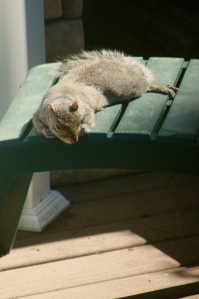 Yes, our aged dog barks more frequently due to his recent loss of hearing. But you egg him on with your clever squirrel acrobatics: dangling from the tops of our squirrel-proof bird feeders. Leaping through the air from my husband’s woodpile, only to now plunge to the ground since he’s set it further away from the feeder after seeing my photographs.
Yes, our aged dog barks more frequently due to his recent loss of hearing. But you egg him on with your clever squirrel acrobatics: dangling from the tops of our squirrel-proof bird feeders. Leaping through the air from my husband’s woodpile, only to now plunge to the ground since he’s set it further away from the feeder after seeing my photographs.
Do you give up? No, of course not! Why should you? You’re a squirrel, and now your entire community is copying you. I might as well supply you with colorful costumes, a trampoline, and a tightrope. I can invite the media or shoot a video for YouTube, and then continually check my stats. Not happening. Though our granddaughter is nothing less than thrilled by this prospect and has designed tickets she wants me to print out so she can sell them to our neighbors.
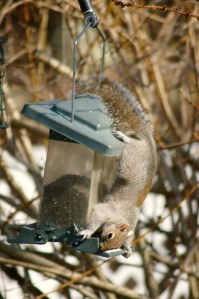 I don’t have time to host a circus of squirrels in my backyard.
I don’t have time to host a circus of squirrels in my backyard.
I’d rather write.
So for the past few weeks, I’ve kept the door to my writing room shut, put up a BIRD FEEDING ZONE sign outside, and tried to convince myself that Old Dog was not barking incessantly.
Until today.
Today, I heard a banging on my front door. It sounded like a person knocking. So I stopped mid-paragraph in an important revision, and headed down the hall, into the living room. There was an edge of anticipation. I am expecting a number of books. Books I am anxious to read.
I opened the front door and looked straight ahead.
No delivery person.
I looked down.
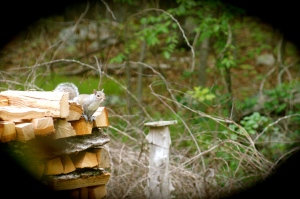 No package left on the ground.
No package left on the ground.
No anxiously awaited books.
Only two squirrels, one of which I presume was you, Mr. Squirrel.
And when I refused to invite you inside, not just because the dog was going nuts upon seeing your face pressed against the glass, you sat down. You stared at me, you and your friend or brother or sister or spouse or offspring. And then, as if you blew on a little whistle to call in your troops, squirrels imploded onto our front deck, grabbing our white railing. I watched you spring to the edge of our picture window, and then swing into our window bird feeder with your not-so-little friend.
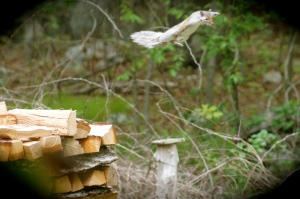 Two squirrels cannot squeeze together in the feeder. It is not a circus clown car.
Two squirrels cannot squeeze together in the feeder. It is not a circus clown car.
And I did not appreciate watching my expensive bird feeder split in half as you two Numskulls forced your way free and crashed the feeder to the ground.
Lastly, it seems as if you have an identity crisis. You have taken to lounging in our porch chair for lengthy squirrel siestas, after which you drink from the hummingbird feeder. Which makes Old Dog bark until he passes out.
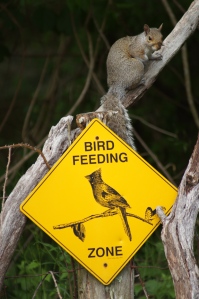 You are not a hummingbird, Mr. Squirrel.
You are not a hummingbird, Mr. Squirrel.
Please relocate immediately.
Signed,
A children’s writer seeking peace and quiet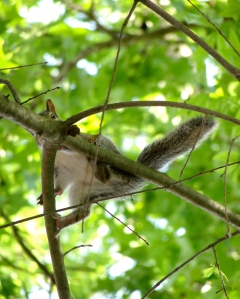
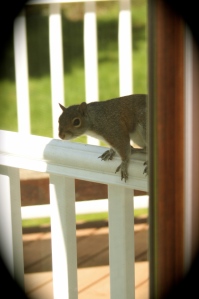
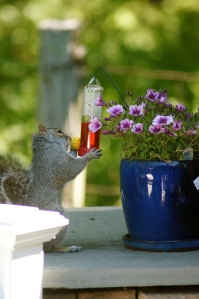


I decided to repost this from two years ago because it involves the love of a father for a son. This experience from the toy store reminds me that gifts do not always come wrapped in pretty paper with spiral ribbon. They sometimes come in the shape of stories. This story was a gift I received, and one I will treasure as long as I live. Happy Father’s Day!
A WHALE FOR STEVEN
by Betsy Devany
Closing time has come and gone at Olde Mistick Village, the sidewalks are filled with more ducks than people shopping. The neighboring stores are dark, their doors locked, and their employees on their way home. It is time for me to call it a night.
The marionettes swing in the breeze; the pink flamingo seems to wink at me. I gather the puppets outside to carry them into the store. Behind me there is quacking. The three ducks who rule our front yard are on alert. The white leader honks at a lone male that slipped under the fence and entered their territory. The leader’s two sidekicks join in the chase, nipping at the uninvited younger mallard. The white duck pecks at the intruder’s neck; his wings flap with agitation. I move towards the gang of birds, clapping my hands until they separate.
“Do you break up fights every day?”An older man walks in my direction, followed by a younger man. With the same chiseled chins, the two are clearly father and son.
“This is the first fight I’ve seen today.”
“You still open? We won’t be long, I promise.”
“Uh . . . sure, yes, come on in.” I smile.
“We need to hurry, Steven. This woman wants to close.”
Steven, who looks to be in his late thirties, dashes into the store. “Whales, where are your whales?” His attention shifts rapidly from shelf to shelf. “I need a whale.” He looks up. He looks down. Lions are pulled from their shelves. Tigers. Bears. Cats. Dogs. None of the stuffed animals are right. Hoping to locate the whale he remembered having as a child, Steven continues to push toys aside. He mutters, “Big. Brown. Brown with beans . . . Big. Brown. Brown with beans . . .”
“He’ll never find it, not the way his was, with the fabric worn around the tips of the eyes and the end of the tail from his constantly caressing it.” His father adds. “And the head was flat from Steven leaning into it, night after night, when he was a child.”
Steven, who has traveled over an hour to get here, is missing more than just a stuffed whale from his childhood.
We do not sell brown whales in the toy store, nor do we sell giant whales. The largest we have is a 24-inch white beluga whale. I hand Steven the beluga. He brings it close to his nose, leans his cheek against it, and slides his face back and forth brushing the fabric. “Do you have a bigger whale . . . brown whale . . . filled with beans?”
“No, we don’t, I’m sorry.” While I search for anything close to what he describes, Steven paces . . . and paces . . . and then he notices the three-foot lobster displayed on a high shelf above his head. He stands on his tiptoes and reaches for the stuffed sea creature. “This will do,” he says.
“No, Steven, we’ve done this before. You’re not thinking clearly.” The father takes the lobster away and leaves the beluga whale in his son’s arms. He sighs—a long sigh. His hair is grey and thin. He removes his glasses and wipes them clean. He sighs again, and then says to his son, “We’ve made these trips over and over again, from New York to Massachusetts, and to anywhere else that might hold the promise of a brown whale. Steven . . . Steven, look at me, son.”
Steven’s hold on the beluga whale loosens. I catch it before it hits the ground. “We have catalogs. Perhaps I can find a large enough whale for you,” I say and hand him back the beluga.
The ends of the father’s mouth turn up, forced out of kind appreciation. “That’s nice of you, but we’ve been looking for a very long time. I never know what he wants.”
I head to the back stock room, grab six catalogs, and carry them to the front desk. Steven follows me, his arms clutching the beluga.
“How big of a whale do you want?” I ask.
“Very big.” Steven focuses on his shoes while clinging to the toy. We go back and forth. I flip through pages. He peers at pictures. “No, not right,” he tells me over, and over, and over again.
His father stands next to him. “Steven, look at me. Look at me, please.” Finally, Steven lifts his eyes. “We aren’t going to find a whale. Not like your whale.”
“I want a whale,” says Steven. “I want a big, brown whale with beans.”
“Steven, we need to leave. This kind lady wants to go home.”
“My whale, we came to get my whale,” Steven reminds his father.
The father turns away from the counter and gently tugs at his son’s arm. Steven digs his heels in. Thirty minutes have passed since they first walked into the store.
“Tell me about your whale,” I say.
“He doesn’t know what he wants. I’ve been looking and looking—they just don’t make toys like they used to.” His father tugs again.
“Steven, what did you love most about your whale?”
Steven turns, looks at me, and walks back to the oak counter. He runs his hands along the wood. “I liked the way the beans inside felt.”
“They don’t make animals with those beans anymore. Too many safety concerns,” I say.
Steven swirls his fingers around the shape of a large knot in the oak.
His father sighs. “Thank you for trying, but he’ll never understand.”
I arrange the pens next to the register; straighten the shopping bags. I glance in Steven’s direction. “Besides the beans, what else did you love about your whale?”
“Soft, it was soft . . . I could sleep on it.”
We have a two-foot penguin, but it is not soft. We have large stuffed dogs, but they are not whales. We have a three-foot lion, but the color is tan, like a pale honey.
Then I remember Gus. “I have a bear, a large bear,” I tell him. “And it’s brown.”
Steven studies the floor. “I want a whale. I need to bring a whale home tonight.”
The three of us stand in silence. I check the time. The owners must be wondering why I haven’t called with the day’s sales.
“Let me show you the bear,” I say.
“It’s hopeless. We’ve kept you long enough,” the father says.
“I’ll be right back.” From the stuffed animal room, I carry the three-foot floppy bear to the front desk. Gus has lived in the store for quite some time now. Before I close up at night, he gets an extra pat.
“He’s very soft,” I tell Steven.
“It’s not a whale.”
Now, I am the one studying my shoes. “I won’t be able to find you a large whale tonight. Just hold the bear, see what you think. He’s brown and soft. You can lean into him.” I hand Steven the bear.
He pushes his nose against Gus. He plops Gus against the counter and leans into him. “He is soft. I like him.”
“Yes, I like this bear myself—very much.”
The father pulls at the price tag. “The bear is $130. You didn’t bring enough money.”
Silence returns. I shift the catalogs together and form a single stack, place them on the floor.
The father stares at the door. Steven’s face is buried into Gus’s fur.
I want to buy him the bear, show him he can love Gus as much as the whale. I want to watch him walk down the sidewalk with the bear in his arms, even though it’s always hard when I let go of a stuffed animal I’ve grown attached to, but Steven did not bring enough money.
Then, holding the bear tightly in one arm, Steven reaches into his pants pocket. He removes a black leather wallet, worn with holes visible at every corner. It is a wonder the wallet doesn’t explode all over our wooden floor. A penny pokes through one end, but does not fall out. His wallet is thick with papers, some yellowed, some coated in a worn plastic. There is almost five inches thick of paper memories.
His father settles into a stance; feet spread apart, firmly planted on the wooden floor—a familiar routine, I imagine. His hands out of his pockets, he turns his palms upward, as if waiting at a communion rail.
Steven pops the wallet open and forms the shape into what appears to be a triangular leather cup. “I want the bear,” he says.
“Let’s count,” says his father.
Steven places two twenties on our wooden counter, then another crumpled twenty.
“How much is that,” asks his father.
“Sixty,” says Steven with confidence.
I separate the bills. “Eighty, you have eighty dollars here.”
Steven pulls out a five and a ten—ninety-five. When he stretches the leather further, the penny falls to the floor, where it remains. Next, come the one-dollar bills, all carefully folded into triangles, the points as worn as the wallet.
“One. Two. Three,” he counts.
There is something magical about the wallet, which is not diminishing in size. Instead of pulling rabbits from a magician’s hat, he conjures up one-dollar bills out of faded leather. How does the wallet hold all of the tightly folded shapes? I expect him to run out of money, yet Steven continues to hand another and another dollar bill to his father, never looking up or breaking his rhythm. Not once.
His father unfolds and flattens each bill, using a quarter to work out the creases.
The stack of money on the counter grows higher.
I wait and watch. “Why do you fold the dollar bills into triangles?”
Holding one bill in his hand, Steven lifts it to the corner of his right eye. “When I’m sad . . . this makes me feel better.” He taps the edge of the triangular shape against his skin. Three times. He passes the bill to his father.
“May I ask what Steven has?”
The father talks and talks and talks, like a dam overflowing. Like a man who hasn’t been noticed in years.
I cannot tell you what the father was wearing that day, but I can tell you his words—his story. I can describe the medicine bottle he has carried in his pocket from the seventies, day after day, year after year. The label so worn that it barely reveals the name of the pharmacy. Except for the lingering chalky stink of medicine, the bottle remains empty. The father rolls the medicine bottle between his palms as he tells me that the colored dye in the medicine, administered when Steven was a baby, caused a cerebral allergic reaction. Steven has two markers of autism, and some mental retardation. Years later, they learned that the damage was irreparable—long after Steven’s mother left, taking his brother and sister with him. Steven was six years old at the time. The mother changed her last name, never contacting Steven and his father.
The father talks and talks while Steven continues to pull one-dollar bills from his wallet. He earns $100 per month, emptying trash containers at a pharmaceutical company.
“You really love that wallet,” I say.
Steven nods, eyes still downcast, his larger lip protruding over his top lip—almost swollen looking.
“When did Steven lose his whale? Do you have a picture?” I ask the two men, one talking and talking, the other pulling triangles of money from a worn leather wallet.
His father quickly shakes his head. “No, not with us; it upsets him.”
“It makes me sad,” adds Steven. He taps the corner of his right eye with another folded dollar bill.
“How long ago did he lose this whale,” I ask.
“Six, he was six years old,” his father says.
I lose count of the money on the counter; imagine Steven as a six-year-old boy snuggled against his mother, the whale by his side until the two of them banished at the same time. Is his search for a whale or a mother who abandoned him?
“You only have $128. Are you sure this is what you want?” the father asks.
Steven hugs the bear to his chest. Gus’s feet dangle at his knees. “I want the bear. It’s a soft bear.”
“You don’t have enough money,” his father tells him.
Steven opens his wallet. He peers into it, pulls out the yellowed papers.
The magic is gone.
“I . . . I can—give you 10% off.”
“You don’t have to do that,” the father says.
“Yes, I do.” I smile and ring up the sale, recount the money and hand him $4 change. I make a mental note to pay the difference after they leave. Steven immediately folds the dollar bills into triangles before tucking them into his wallet.
“I hope the bear makes him happy.” The father strokes Gus’s arms. “I never see any emotion from him anymore, he’s on so much medicine; it numbs his emotions, his personality. At least he doesn’t scream and cry like he used to. But he never laughs or smiles, either.”
“I’m hungry,” Steven says.
“What do you feel like eating?” I ask.
“Steak!”
I give the father directions to a nearby restaurant and recommend they walk through the village so they can stop at the pond to admire the newly hatched baby ducks.
“I have to put my bear in the car first, so he’s safe,” says Steven.
The two men step outside the store. I bend over to unlatch the door in preparation for closing, and as I do, Steven turns to me and smiles, revealing slightly yellowed teeth.
“You have a beautiful smile,” I say.
The ends of Steven’s mouth turn up even more. Now his father grins. “I haven’t seen him smile is such a long time. It is worth more than the cost of the bear, more than the time in the car and the price of gas.”
“I hope your search is over. How long has he been hunting for the whale?” I ask.
“Thirty years, just Steven and me, we’ve been looking for thirty years.”
Steven’s smile is broad. He is thirty-six years old and no longer fixated on his shoes.
“Thank you for listening,” the father says. “Thank you for allowing me to go on and on.”
“That’s what I am here for. Have a nice night.”
If I could, I would have found them a large brown whale filled with beans. But all I found was a bear named Gus, and for once, it seemed to be enough.


 Growing up in the Devany family, I was beholden to my mother’s Look Beyond Yourself Birthday Tradition, which stemmed from her philosophy to always think about other people. On their one special day in the year, the birthday child had to buy (or make) gifts for their siblings. In my case, there were three. Grabbing anything off a shelf was not allowed, she wanted us to think about what each person would really enjoy. It was a lot of pressure, and some years we tried to outdo one another.
Growing up in the Devany family, I was beholden to my mother’s Look Beyond Yourself Birthday Tradition, which stemmed from her philosophy to always think about other people. On their one special day in the year, the birthday child had to buy (or make) gifts for their siblings. In my case, there were three. Grabbing anything off a shelf was not allowed, she wanted us to think about what each person would really enjoy. It was a lot of pressure, and some years we tried to outdo one another.
 My second birthday without my father was yesterday. Last year’s was tough. I had no desire to celebrate. I let the phone ring without answering. I spent hours alone by a reservoir, watching birds. My gifts sat on the table unopened. Not until I saw two great egrets, one landing high in a tree while the younger one fished, did I realize the problem. I’d been waiting for something. When the elder flew off, as if confident that the younger bird would be okay on its own, I knew.
My second birthday without my father was yesterday. Last year’s was tough. I had no desire to celebrate. I let the phone ring without answering. I spent hours alone by a reservoir, watching birds. My gifts sat on the table unopened. Not until I saw two great egrets, one landing high in a tree while the younger one fished, did I realize the problem. I’d been waiting for something. When the elder flew off, as if confident that the younger bird would be okay on its own, I knew.
I’d been waiting for my dad to call and wish me a happy birthday.
 Yesterday, I rose early to write. I wrote for four hours, my way of connecting with my father on the day I long for him the most. Then I thought about my mother’s birthday tradition. I looked beyond myself and discovered what makes a birthday joyous are simple, unexpected moments. When you find yourself cheering for others on your special day, and moments like these:
Yesterday, I rose early to write. I wrote for four hours, my way of connecting with my father on the day I long for him the most. Then I thought about my mother’s birthday tradition. I looked beyond myself and discovered what makes a birthday joyous are simple, unexpected moments. When you find yourself cheering for others on your special day, and moments like these:
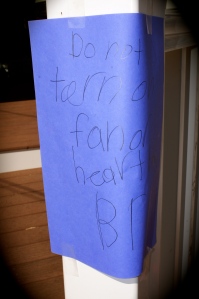 The hummingbirds returned.
The hummingbirds returned.
A momma bird laid her final egg in a nest atop our porch fan. My seven-year-old granddaughter made a sign, warning everyone to Not Turn on the Fan because babies are sleeping.
Ava and I wandered your yard, searching for hidden beauty. Both of us with cameras. She discovered tulips, which I don’t recall planting.
An overwhelming number of people wished me a happy birthday, which meant so much to me. Truly, I can’t thank you enough.
My eldest daughter scored a 97 in her nursing exam.
 My youngest daughter was invited to teach at the prestigious Gathering 2013 for Paul Mitchell as an educator.
My youngest daughter was invited to teach at the prestigious Gathering 2013 for Paul Mitchell as an educator.
We saved a bumblebee that was trapped in our window.
Ava’s excitement over spotting birds in our yard—cardinals, yellow finch, hawks.
Gorgeous sunrise at the start of the day.
To be captured by a child’s wonder. “Grandma! Look how blue that flower is!”
 The day ended with a wonderful Italian dinner out with my family. I returned home with my husband to find colored pencils strewn across our living room table, and a picture, Ava had made. Perhaps she knew what I’d wished for earlier that day when she picked up a dandelion. My greatest treasures are handmade by small hands with the purest of love.
The day ended with a wonderful Italian dinner out with my family. I returned home with my husband to find colored pencils strewn across our living room table, and a picture, Ava had made. Perhaps she knew what I’d wished for earlier that day when she picked up a dandelion. My greatest treasures are handmade by small hands with the purest of love.
“Grandma, do you know this is a wishing flower?” she had whispered, as if she held magic in her hands.
“It is?”
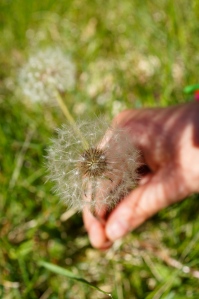 “Yes,” she said, holding it to my lips. “Make a birthday wish.”
“Yes,” she said, holding it to my lips. “Make a birthday wish.”
Sometimes, wishes do come true.



 More months than I would have hoped for have passed since my last blog post. It’s not as if I haven’t been writing. I have. For hours on end. At this time in my life, the work I do on my novels bears more importance because ultimately, I want to leave something behind on this earth. Something beautiful. Whether it be through published works, photographs, or inspiring the children I encounter on a daily basis, that is where my main focus remains. Still, I enjoy blogging, so I am jumping back in with hopes that I can resume a more regular routine. Thank you for bearing with me.
More months than I would have hoped for have passed since my last blog post. It’s not as if I haven’t been writing. I have. For hours on end. At this time in my life, the work I do on my novels bears more importance because ultimately, I want to leave something behind on this earth. Something beautiful. Whether it be through published works, photographs, or inspiring the children I encounter on a daily basis, that is where my main focus remains. Still, I enjoy blogging, so I am jumping back in with hopes that I can resume a more regular routine. Thank you for bearing with me.
I recently returned from a three-day stay at The Writing Barn in Austin, Texas. This inspiring place of sanctity is run by author Bethany Hegedus, who couldn’t be more kind, welcoming, or talented. The Writing Barn is just as welcoming with its endless shelves of books, calming figurines, and the artwork of E. B. Lewis, all of which greets you when you walk through the front door. Before you even unpack your bags, you know you won’t want to leave. You want to breathe everything in, read the array of fabulous novels, books on writing, all there for visitors to enjoy. You want to sit outside and watch hawks soar above the grounds, traipse past cactus plants in search of a bunny you spot on the drive in. And the baby deer romping through the thicket, you want to enjoy their presence.
You unpack your bag and get to work, because that is why you are here. To learn. To grow. To absorb the energy that exists in this beautiful place. To look deep into your current WIP and be truthful about what needs to change. Because in order to grow, one must change, even in the way we approach our writing.
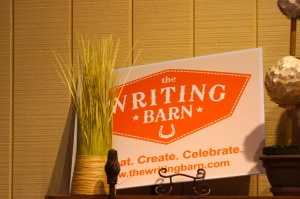 I was fortunate to have a dear writer friend with me. Both Nanci Turner Steveson and I had important revisions to tackle. We had read each other’s manuscripts. We took vows to be honest, painfully honest about what didn’t work, while emphasizing the qualities that stood out. While compliments are nice, I’d prefer to know where I’ve fallen short in my writing. I thrive on revision, really. It makes me feel alive, it brings out the best in me. I always tell my agent to hold nothing back in terms of questions or asking me to delve deeper. The more intense a revision, the happier I am. The most valuable critique groups, or critique partners, are those that aren’t afraid to be honest. How else do you get better?
I was fortunate to have a dear writer friend with me. Both Nanci Turner Steveson and I had important revisions to tackle. We had read each other’s manuscripts. We took vows to be honest, painfully honest about what didn’t work, while emphasizing the qualities that stood out. While compliments are nice, I’d prefer to know where I’ve fallen short in my writing. I thrive on revision, really. It makes me feel alive, it brings out the best in me. I always tell my agent to hold nothing back in terms of questions or asking me to delve deeper. The more intense a revision, the happier I am. The most valuable critique groups, or critique partners, are those that aren’t afraid to be honest. How else do you get better?
 My stay at The Writing Barn did wonders for my soul. It could have been the colorful lanterns that swing in the trees, the sound of Nanci tapping on her laptop with her headphones on, or the moments of clarity that would happen after taking a photography break outside. There is a sense of peace here, and writing juju. While not quite tangible, you feel the wisdom left behind by previous writers, many of them published authors. In the porch beyond the kitchen, the wooden beams hold the signatures of published illustrators/writers. Every now and then I’d look above me, knowing that I, too, would sign a beam one day.
My stay at The Writing Barn did wonders for my soul. It could have been the colorful lanterns that swing in the trees, the sound of Nanci tapping on her laptop with her headphones on, or the moments of clarity that would happen after taking a photography break outside. There is a sense of peace here, and writing juju. While not quite tangible, you feel the wisdom left behind by previous writers, many of them published authors. In the porch beyond the kitchen, the wooden beams hold the signatures of published illustrators/writers. Every now and then I’d look above me, knowing that I, too, would sign a beam one day.
 We have to believe in our writing, even when we close ourselves around our work, protecting it. Do not be afraid to do this. Think of your work as precious, like a baby fawn not ready to be on its own. For the most part, all else is beyond your control. The only thing that matters is that you do the work. Day in and day out, to the best of my ability. My father always told me to protect the energy surrounding a story, to keep it safe, until it was strong enough to send out into the world.
We have to believe in our writing, even when we close ourselves around our work, protecting it. Do not be afraid to do this. Think of your work as precious, like a baby fawn not ready to be on its own. For the most part, all else is beyond your control. The only thing that matters is that you do the work. Day in and day out, to the best of my ability. My father always told me to protect the energy surrounding a story, to keep it safe, until it was strong enough to send out into the world.
So that’s what I’ve been doing since I returned from The Writing Barn. Revising, revising, revising. Writing, writing, writing. Aside from that, I am living life, always thankful for the people I hold closest to my heart, thankful for the wonderful books I read each night before falling asleep, and thankful that places like The Writing Barn exist.
My deepest gratitude to Bethany Hegedus, who believed in creating this barn of wonder and inspiration and much beauty. Thank you for sharing your joy of writing with others.
 For more on information on booking an individual writing retreat or attending one of their classes, go to: http://www.thewritingbarn.com.
For more on information on booking an individual writing retreat or attending one of their classes, go to: http://www.thewritingbarn.com.
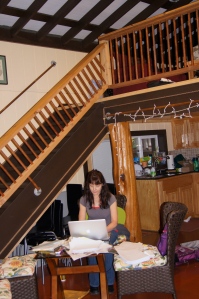









By: Betsy Devany,
on 8/30/2012
Blog:
Betsy Devany's Blog
(
Login to Add to MyJacketFlap)
JacketFlap tags:
Add a tag
 It seems like forever since I’ve last posted on my blog. So much has happened over the past four months, and I apologize for not including you in my recent journeys. I have, in fact, been writing each and every day, for up to five hours at a time. In addition to working the long summer hours at the toy store, my brain was focused on ripping apart a beloved novel because I had a “bit of worry.” (I am forever grateful to the editor who used this phrase in their rejection letter, as their worry led to my worry.) I’ve spent May and June being brave, and doing something I’d never tried before. I bid a heartfelt adieu to a character in Savannah’s Mountain, and then found the courage to sit back and wait for Savannah to return to me. Whisper to me. And she did, and I listened, and I discovered that another character belonged within the pages of her story. As I tossed aside chunks of the manuscript, my father’s words echoed in my head. And this gave me strength and hope that I could face the challenge.
It seems like forever since I’ve last posted on my blog. So much has happened over the past four months, and I apologize for not including you in my recent journeys. I have, in fact, been writing each and every day, for up to five hours at a time. In addition to working the long summer hours at the toy store, my brain was focused on ripping apart a beloved novel because I had a “bit of worry.” (I am forever grateful to the editor who used this phrase in their rejection letter, as their worry led to my worry.) I’ve spent May and June being brave, and doing something I’d never tried before. I bid a heartfelt adieu to a character in Savannah’s Mountain, and then found the courage to sit back and wait for Savannah to return to me. Whisper to me. And she did, and I listened, and I discovered that another character belonged within the pages of her story. As I tossed aside chunks of the manuscript, my father’s words echoed in my head. And this gave me strength and hope that I could face the challenge.
Set aside your personal feelings and do what serves the story best.
 I hope, dear readers, to share more about this process and about other journeys, I’ve traveled since May. But for now, I have something important to do: I need to tell my father my good news: news he’s been expecting for almost twenty years.
I hope, dear readers, to share more about this process and about other journeys, I’ve traveled since May. But for now, I have something important to do: I need to tell my father my good news: news he’s been expecting for almost twenty years.
Dear Dad,
It has been nearly a year since I last held your hand, stroked your head, and told you that it was okay to leave this earth. I know you wanted so much to hang on, and those words “I need to live long enough to see you published” stay within my heart. It is okay that you let go. You deserved to be in peace, without pain. And perhaps that is what needed to happen in order to allow each of us to grow. Since your death, I’ve worked even harder, and my writing has gone to places I’d never imagined. Maybe a bit of your immense talent was left behind on this earth, and now tiny pieces are growing within the hearts and souls of your family.
Lately, your presence is strong, and it brings me much comfort. Perhaps a bit of your spirit was in the dragonfly that insisted on sitting on our jade plant, twisting and turning his head, giving me a quizzical look. It stayed with me for nearly an hour, as if to watch and make sure I was writing on the porch and doing my work as I promised you I would. You may have been the butterfly that posed for over twenty minutes among our flowers or the red-tailed hawk soaring in the sky above me when I learned some good news.
 These are moments when I look up at that great blue sky or wonder at the beauty of a sunset or lose my breath over a glorious full moon or take great joy at seeing your great-granddaughter in awe of a beluga whale. This is when I become the little girl sitting next to you in our backyard long ago, watching your fingers fly across a yellow legal pad as you tried to keep up with the setting sun. I remember swinging my growing legs, not knowing how the deep desire to write was finding its way from where you sat in a sagging lawn chair into my heart. This is when the creative seed was planted, only to grow and grow over the years, until I could no longer ignore the passion.
These are moments when I look up at that great blue sky or wonder at the beauty of a sunset or lose my breath over a glorious full moon or take great joy at seeing your great-granddaughter in awe of a beluga whale. This is when I become the little girl sitting next to you in our backyard long ago, watching your fingers fly across a yellow legal pad as you tried to keep up with the setting sun. I remember swinging my growing legs, not knowing how the deep desire to write was finding its way from where you sat in a sagging lawn chair into my heart. This is when the creative seed was planted, only to grow and grow over the years, until I could no longer ignore the passion.
Now, it is still dark outside, and I have been awake since 4 a.m., because before I can go on to the stage of becoming a published author, I need to hear your voice and tell you what you’d been waiting for all these years. You saw something in me that I didn’t yet understand. At times, I still don’t. So I settle on my porch in a lawn chair and listen to one of the recordings of that wonderful, musical voice of yours. Hearing you speak gives me much comfort, and I thank you for letting me record you over the last year of your life.
 Are you listening, Dad? I got the call, and I now have a brilliant and loving agent (Emily van Beek with Folio Literary), who speaks of my writing with a tone so familiar, I poured over all your emails, I can never delete. And there it was. My Emily’s words reflect yours. So perhaps you had a hand in this. Perhaps you sent her to me so I can be pushed, and will then ultimately give my best work to the world. Know that I am listening, and that I will continue to listen to you, Dad.
Are you listening, Dad? I got the call, and I now have a brilliant and loving agent (Emily van Beek with Folio Literary), who speaks of my writing with a tone so familiar, I poured over all your emails, I can never delete. And there it was. My Emily’s words reflect yours. So perhaps you had a hand in this. Perhaps you sent her to me so I can be pushed, and will then ultimately give my best work to the world. Know that I am listening, and that I will continue to listen to you, Dad.
Know that I’ve kept my promise.
Lastly, I want you to assure that we are all good here on this earth: your children, your grandchildren and your great-grandchildren. And Mom, we are watching out for Mom.
Not a day goes by when I don’t miss you, when I don’t give thanks for having had you in my life. I am so, so lucky.
I love you oodles and boodles and Skittles galore.
Your daughter, Betsy
P.S.- Dad, I’m doing great. I hope you are too.



The New Jersey SCBWI annual conference approaches. Are you attending? I hope so!
As excitement builds for the event, so does anticipation for what will be offered at the Silent Auction this year. Plus, there will be critiques to bid on, offered by our generous NJ-SCBWI published members, as well as editors and agents. Great opportunities for writers! All proceeds go to the scholarship fund.
Donations are needed and being accepted up until the conference dates. Let me know if you would like to be a part of these auctions. Your participation will be most appreciated! There will be a Power Point Presentation with slides of what is donated and by whom. At your earliest convenience, let me know what you are bringing, and include a picture, please.
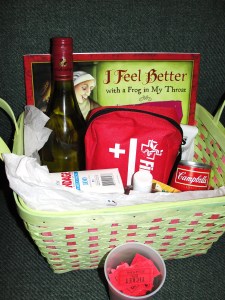

If you would like to donate but are unsure what to do, consider making a basket. Each year, the Whispering Pines Writer’s Weekend Retreat has a silent auction featuring baskets made and donated by the attendees. Always fabulous! First, you pick a theme, and then fill a basket or container to your heart’s desire. Add ribbons, colorful tissue, and whatever else to make the presentation pop. Finish off with a creative sign listing the contents of your basket. Each year, I love putting together the baskets I donate to both regions: NE-SCBWI and NJ-SCBWI.
Don’t you want to have fun? AND, this year, WE ARE HAVING A CONTEST FOR THE MOST CREATIVE BASKET/CONTAINER! Every conference attendee will get to vote on their absolute favorite, most creative basket being offered in the Silent Auction. The lucky winner, who kindly donated a basket/container will receive a $25 gift certificate to Barnes & Noble.
Now that I have your creative mind thinking about the challenge, here are some suggestions:
1. A Relaxation Basket for Weary Writers – include a bottle of wine, or two, bubble bath, chocolate, more chocolate, an eye mask, and perhaps a relaxation CD. 2. Basket of All Things Dinosaur – (for those writers with young children or grandchildren) include dinosaur books, dinosaur toys, perhaps a dig-your-own dinosaur fossil. 3. Think Pink, Pink, Pink For Those Precious Princesses in Our Lives – include a crown, nail polish, a princess book, etc. 4. I Got Another Rejection, Now What? - a ‘no’ button, a box of kleenex, stamps and envelopes for sending the submission right back out into the world, chocolate, bubble bath, and a mirror to look into, which has the words Only Your Manuscript Has Been Rejected, Not You. 5. Basket of Award Winning Children’s Books
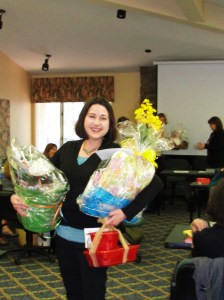 These are only examples to help you with ideas. Now, what can you come up with?
These are only examples to help you with ideas. Now, what can you come up with?
If you are attending the conference, please partake in the Silent Auction. You could look as happy as Carlyn Beccia is in this photo after her winning streak at Whispering Pines.
So start thinking about basket themes, and I look forward to hearing from you! Thanks for all the generous

By: Betsy Devany,
on 4/23/2012
Blog:
Betsy Devany's Blog
(
Login to Add to MyJacketFlap)
JacketFlap tags:
SCBWI,
Sara Zarr,
Jane Yolen,
Writing conferences,
Kate Messner,
Brian Lies,
Harold Underdown,
Sarah Aronson,
New England SCBWI,
Harry Bliss,
Nancy Werlin,
Carolyn Coman,
Betsy Devany,
Crystal Kite Award,
Ann Barrows Scholarship,
NE-SCBWI 2012 Conference,
Ruth Landers Glass Scholarship,
Add a tag

 This year’s NE-SCBWI Conference (my sixth) was different for me. As the On-the-Spot Critique Coordinator, I was one of numerous volunteers responsible for making a successful conference. In my position, I felt deeply obligated to the attendees, wanting to facilitate proper connections to editors/agents, and I’d promised these same professionals that I’d do my best to secure them additional critiques. In truth, I was scared. Since becoming the On-the-Spot Critique Coordinator less than a month ago, I have secretly fretted, while my daily early-morning writing time turned into early-morning e-mail communication, chart-making, and teaching myself how to make a spreadsheet. (I am also a committee co-chair for the upcoming New Jersey SCBWI Conference.) My manuscripts lay untouched; my muse went on strike.
This year’s NE-SCBWI Conference (my sixth) was different for me. As the On-the-Spot Critique Coordinator, I was one of numerous volunteers responsible for making a successful conference. In my position, I felt deeply obligated to the attendees, wanting to facilitate proper connections to editors/agents, and I’d promised these same professionals that I’d do my best to secure them additional critiques. In truth, I was scared. Since becoming the On-the-Spot Critique Coordinator less than a month ago, I have secretly fretted, while my daily early-morning writing time turned into early-morning e-mail communication, chart-making, and teaching myself how to make a spreadsheet. (I am also a committee co-chair for the upcoming New Jersey SCBWI Conference.) My manuscripts lay untouched; my muse went on strike.
 Preparing for the conference reminded me of my earlier years in the business of writing for children, when I was unsure and questioned my abilities. Self-doubt hinders your growth as an artist. So I stopped thinking about What Might Not Happen (that the on-the-spot critiques would be a failure) and I began to believe that I could, indeed, pull this off. But to do this, I had to call on my Inspired Frame-of-Mind, which is strong, determined, and follows the muse with much delight, like a kitten chasing an unraveling ball of red yarn. I write what my characters tell me, and on some level, believe they are the ones shaping their stories, not me. I continue to struggle with writing for my blog, for that voice comes from a different place, where self-criticism has rented a tiny room and ignores my weekly eviction notice.
Preparing for the conference reminded me of my earlier years in the business of writing for children, when I was unsure and questioned my abilities. Self-doubt hinders your growth as an artist. So I stopped thinking about What Might Not Happen (that the on-the-spot critiques would be a failure) and I began to believe that I could, indeed, pull this off. But to do this, I had to call on my Inspired Frame-of-Mind, which is strong, determined, and follows the muse with much delight, like a kitten chasing an unraveling ball of red yarn. I write what my characters tell me, and on some level, believe they are the ones shaping their stories, not me. I continue to struggle with writing for my blog, for that voice comes from a different place, where self-criticism has rented a tiny room and ignores my weekly eviction notice.

 So in my Inspired Frame-of-Mind, I faced the task of being a successful conference coordinator: I worked diligently and focused on being positive, while doing everything possible to sell these critiques. The bar to succeed is set high due to the tireless efforts of our region’s longtime coordinators, who have given so much of their time over the years: Marilyn Salerno, Joyce Shor Johnson, Kathryn Hulick, Melissa Hed. Valarie Giogas. Laura Pauling. Melissa Stewart. Casey Girard. Betty Brown. Sally Riley. Jean Woodbury. Linda Brennan. Jennifer Carson. Joannie Duris. Anna Boll. Jennifer O’Keefe. Greg Fishbone. Francine Puckly. Margo Lemieux. And Shirley Pearson, who I hope can one day step out from behind the registration table to pursue her own dreams. I apologize in advance for not listing every name, though my gratitude is intended for all. Thank you! The NE-SCBWI Conference reflects your efforts, selfless dedication, and enthusiasm for our wonderful community. A community filled
So in my Inspired Frame-of-Mind, I faced the task of being a successful conference coordinator: I worked diligently and focused on being positive, while doing everything possible to sell these critiques. The bar to succeed is set high due to the tireless efforts of our region’s longtime coordinators, who have given so much of their time over the years: Marilyn Salerno, Joyce Shor Johnson, Kathryn Hulick, Melissa Hed. Valarie Giogas. Laura Pauling. Melissa Stewart. Casey Girard. Betty Brown. Sally Riley. Jean Woodbury. Linda Brennan. Jennifer Carson. Joannie Duris. Anna Boll. Jennifer O’Keefe. Greg Fishbone. Francine Puckly. Margo Lemieux. And Shirley Pearson, who I hope can one day step out from behind the registration table to pursue her own dreams. I apologize in advance for not listing every name, though my gratitude is intended for all. Thank you! The NE-SCBWI Conference reflects your efforts, selfless dedication, and enthusiasm for our wonderful community. A community filled
 Elizabeth Carpentiere, editor of FACES magazine will be at the NESCBWI conference this weekend! She has been the editor of FACES, a world cultures magazine for middle school readers, for 15 years. FACES is one of several award-winning magazines published by Cobblestone Publishing. During her tenure, the publication has received numerous honors and awards including being named a Parents’ Choice Honor Winner and the Most Improved Publication by the Educational Press Association. Elizabeth has also worked on special projects for Cobblestone Publishing including a supplement for the Boston Globe’s Newspapers in Education program. She has also edited several eBooks with more titles to come. Elizabeth began her career in weekly and daily newspapers. In 1997 she was named Writer of the Year by the New Hampshire Press Association.
Elizabeth Carpentiere, editor of FACES magazine will be at the NESCBWI conference this weekend! She has been the editor of FACES, a world cultures magazine for middle school readers, for 15 years. FACES is one of several award-winning magazines published by Cobblestone Publishing. During her tenure, the publication has received numerous honors and awards including being named a Parents’ Choice Honor Winner and the Most Improved Publication by the Educational Press Association. Elizabeth has also worked on special projects for Cobblestone Publishing including a supplement for the Boston Globe’s Newspapers in Education program. She has also edited several eBooks with more titles to come. Elizabeth began her career in weekly and daily newspapers. In 1997 she was named Writer of the Year by the New Hampshire Press Association.
 On Sunday, Elizabeth is giving a workshop on query letters, and on Saturday, she will be available all day for “on-the-spot critiques,” a brand new offering at this year’s conference.
On Sunday, Elizabeth is giving a workshop on query letters, and on Saturday, she will be available all day for “on-the-spot critiques,” a brand new offering at this year’s conference.
Sign up at the registration desk during the conference weekend for the fifteen-minute meeting. You can bring up to five pages of a work in progress (picture book, novel, or magazine article—non-fiction or historical fiction) and/or a query letter, or simply ask questions about the children’s magazine writing industry. Elizabeth is also happy to read/critique retold folktales. The cost is $40.
Come early to secure a slot with Elizabeth! We are thrilled to have her join us this year!








 This year, the NE SCBWI Conference is offering something new: on-the-spot critiques.
This year, the NE SCBWI Conference is offering something new: on-the-spot critiques.
Not to be confused with agent quick query meetings or manuscript/portfolio critiques, this is a new and exciting platform for receiving feedback from an editor or agent. As the On-the-Spot Critique Coordinator, I want to help, so if I haven’t addressed all of your questions, let me know!
What is an on-the-spot critique?
An on-the-spot critique lasts fifteen minutes, the same as a standard critique. The only difference is the editor/agent will not receive your work ahead of time, or have the ability to offer a written critique. In real life, your submissions must garner interest immediately. So this is a rare opportunity to see if your writing can indeed capture a professional’s eye. If it doesn’t, find out why. Ask questions, and always keep in mind that everything is subjective.
 How do I sign up?
How do I sign up?
At the registration table, please ask for Betsy or Shirley, and do come early!
Can we contact you earlier to reserve a spot, via e-mail?
Unfortunately, no. You must sign up during the conference weekend. Spots will be assigned on a first-come, first-served basis.
 What does it cost?
What does it cost?
$40. Payable in cash, or a check made out to: SCBWI New England.
How many spaces are available?
I have secured 50 slots, all thanks to the generous editors and agents.
We are also offering the opportunity to connect with a children’s magazine editor…
This editor from a renowned magazine in the Cricket group edits non-fiction, historical fiction, and retold folktales. Don’t miss your chance to get feedback on writing for this market, especially if you have been told, “Great story, but it might be better suited for a magazine.”
 Which editors and agents are participating?
Which editors and agents are participating?
When you sign up for an on-the-spot critique, we will provide you with a list of available editors and agents.

By: Betsy Devany,
on 4/13/2012
Blog:
Betsy Devany's Blog
(
Login to Add to MyJacketFlap)
JacketFlap tags:
Add a tag
 This year, the method for choosing Whispering Pines attendees came down to the luck of the draw: a lottery. As long as you met the deadline, you had a chance at having your name pulled from the hat. But within a few weeks, I received a sympathetic e-mail from the lovely Mary Pierce. While I felt a sense of loss, I quickly moved on. I spent more hours writing each day, finished another novel, and wrote two new picture books. Writing fills my soul, but I kept flipping to the month of March on the calendar, yearning for the pines that whisper in the early morning, for my friends, and for the opportunities to improve my craft.
This year, the method for choosing Whispering Pines attendees came down to the luck of the draw: a lottery. As long as you met the deadline, you had a chance at having your name pulled from the hat. But within a few weeks, I received a sympathetic e-mail from the lovely Mary Pierce. While I felt a sense of loss, I quickly moved on. I spent more hours writing each day, finished another novel, and wrote two new picture books. Writing fills my soul, but I kept flipping to the month of March on the calendar, yearning for the pines that whisper in the early morning, for my friends, and for the opportunities to improve my craft.
 Why is the Whispering Pines Writer’s Retreat so special? In an intimate setting, it is one of a kind. Yes, the food is fabulous, the setting breathtaking, but in truth it comes down to the mentors. Because of Lynda Mullaly Hunt’s efforts, attendees spend the weekend with welcoming, generous, and astute editors, agents, writers, and illustrators. So when Lynda announced a few openings (provided you wrote picture books), I received a “Yes, you’re in!” e-mail. And on Friday, March 23, I bid my family farewell and headed to West Greenwich, Rhode Island.
Why is the Whispering Pines Writer’s Retreat so special? In an intimate setting, it is one of a kind. Yes, the food is fabulous, the setting breathtaking, but in truth it comes down to the mentors. Because of Lynda Mullaly Hunt’s efforts, attendees spend the weekend with welcoming, generous, and astute editors, agents, writers, and illustrators. So when Lynda announced a few openings (provided you wrote picture books), I received a “Yes, you’re in!” e-mail. And on Friday, March 23, I bid my family farewell and headed to West Greenwich, Rhode Island.

 As soon as you turn down the road leading to the retreat center, your body relaxes. You open your car window to suck in the fresh air. The pine trees pull you further along, welcoming you. Come, they whisper. You are a writer. Come be with your kind.
As soon as you turn down the road leading to the retreat center, your body relaxes. You open your car window to suck in the fresh air. The pine trees pull you further along, welcoming you. Come, they whisper. You are a writer. Come be with your kind.
This year, our fabulous mentors included Michelle Poploff, Vice President, Executive Editor at Delacorte Press; Yolanda Scott, editorial director at Charlesbridge; Andrea Carcardi, Agent at Transatlantic Literary Agency; Suzanne Bloom, Author/Illustrator; Alexis O’Neill, Marketing/School Visits Expert/Author; and Jo Knowles, YA Novelist. When not critiquing individuals, they were available to attendees, always offering encouragement. Their first pages panel offered honest opinions, and ultimately a mini-class on how to craft a first page and grab the reader’s attention from the get go. . Even though my work was not included, I learned so much. I always do.

 Attendees indulged in the finest of foods, had one-on-one critiques, blocks of individual writing time, and critique group sessions. Our annual basket raffle turned into a successful silent auction. Our mentors gave hour-long presentations on both Saturday and Sunday, while t
Attendees indulged in the finest of foods, had one-on-one critiques, blocks of individual writing time, and critique group sessions. Our annual basket raffle turned into a successful silent auction. Our mentors gave hour-long presentations on both Saturday and Sunday, while t

By: Betsy Devany,
on 1/14/2012
Blog:
Betsy Devany's Blog
(
Login to Add to MyJacketFlap)
JacketFlap tags:
Add a tag
 Sometimes I channel my current WIP characters, especially if I have been in a deep state of writing for hours. At times it feels trance like; scenes appear in my manuscript that I don’t remember writing. These scenes stay with me, long after I’ve logged off my computer to head for work at the toy store.
Sometimes I channel my current WIP characters, especially if I have been in a deep state of writing for hours. At times it feels trance like; scenes appear in my manuscript that I don’t remember writing. These scenes stay with me, long after I’ve logged off my computer to head for work at the toy store.
Yesterday, I was so involved in what was happening with my main character, Ibbie-Rae, that I forgot to eat breakfast, and I barely finished my second cup of coffee. After handing the reins to my Sleepy Mind at 6 A.M., I sat back to enjoy the ride, having too much fun thwarting her tightly controlled plans. The more wrenches I threw at her, via a Jerry Garcia obsessed kid, the more fun I had. Though she won’t admit it, eleven-year-old Ibbie-Rae likes to micro manage, especially when it comes to her parents. Enough said on that. (My dad always said, “Keep your stories within; protect them, and allow them to grow as they should, through your writing process. The minute you discuss an under-developed manuscript, precious energy escapes, and sometimes, the desire to finish the story.”) While I am in the revision stage for the completed manuscript, changes are occurring, thanks to characters who have politely informed me that I, the writer, need to let go and listen to them.
 So in the spirit of Ibbie-Rae, I arrive at work, having been up for four hours. I am hungry, but happy to greet the gigantic bear that sits on our front porch. Surprisingly so, the early January weather is warm enough to prop open the front door. I hang the birds outside, vacuum the lower level carpets, restock the bags, and greet the first customers, which is when I see The Note.
So in the spirit of Ibbie-Rae, I arrive at work, having been up for four hours. I am hungry, but happy to greet the gigantic bear that sits on our front porch. Surprisingly so, the early January weather is warm enough to prop open the front door. I hang the birds outside, vacuum the lower level carpets, restock the bags, and greet the first customers, which is when I see The Note.
The Note is my clue that while things appear normal in the lower part of the large, old-fashioned toy store, the upper level may hold surprises for me. I read: “I will be in at noon to help with the boxes.”
The Boxes, I think. How many can there be? I walk up the ramp with slight trepidation, past the dolls . . . past the puzzle area . . . past the books, and . . . the Playmobil shelves are blocked by at least twenty boxes. Manageable, I think, until I notice that a cumbersome Schleich display is no longer pushed against the wall. It has gone missing, so I search, only to find another room filled with twenty or more large boxes. I take a deep breath, try to channel Ibbie-Rae, who would know what to do and already be in the midst of organizing the shipment.
But it doesn’t end there; I can barely see the floor of the science section, there are so many boxes, and there is the missing Schleich rack.
I wish I had eaten breakfast, or at least, finished my coffee.
 I put myself in the mind of my character. How would she handle this challenge? I slice open every box, only to discover that the majority of boxes contain multiple boxes within. I take those boxes out. There are card games, building sets, bowling sets, lacrosse sticks, baby toys, bath toys, baby bottles, Calico Critters and Calico Critters and more Calico Critters, because these little critters (adored by kids) have no recession or
I put myself in the mind of my character. How would she handle this challenge? I slice open every box, only to discover that the majority of boxes contain multiple boxes within. I take those boxes out. There are card games, building sets, bowling sets, lacrosse sticks, baby toys, bath toys, baby bottles, Calico Critters and Calico Critters and more Calico Critters, because these little critters (adored by kids) have no recession or

By: Betsy Devany,
on 1/6/2012
Blog:
Betsy Devany's Blog
(
Login to Add to MyJacketFlap)
JacketFlap tags:
Add a tag
 As a writer for children, I am used to having a new character’s voice come to me at any time of the day or night. I may be dreaming or driving. Bathing or taking a walk. Sometimes, I am working at the toy store, where a conversation with a young child can easily spark an idea.
As a writer for children, I am used to having a new character’s voice come to me at any time of the day or night. I may be dreaming or driving. Bathing or taking a walk. Sometimes, I am working at the toy store, where a conversation with a young child can easily spark an idea.
But never has a project spoken to me, at least in the way that the Look For the Good Project has. It started with a newspaper article I read in our local paper. I recognized the photo of Anne Kubitsky, who I met this past May when we were both honored with a 2011 New Voices in Children’s Literature: Tassy Walden Award. She was the winner in the illustrated picture book category. What a treat to hear her voice read Graycie’s Catch. And what an honor to see her accompanying illustrations. Anne captivated the audience with her heartfelt illustrations, and her obvious love for kindness. (I have always had a soft spot for whales.)
 I cut out the article and posted it near my desk. With Christmas approaching, I hurried to finish photo projects for my girls’ gifts. My time was limited; I was behind in everything. Yet, I could not stop thinking about Anne and the whale and her vision for a community art project that would become part of a traveling exhibit, featuring postcards from all over the world in which people of all ages state what makes them grateful.
I cut out the article and posted it near my desk. With Christmas approaching, I hurried to finish photo projects for my girls’ gifts. My time was limited; I was behind in everything. Yet, I could not stop thinking about Anne and the whale and her vision for a community art project that would become part of a traveling exhibit, featuring postcards from all over the world in which people of all ages state what makes them grateful.
My father would have loved this project and perhaps this is why the idea of it tugged at my heart. Even in pain, he would always stop to be thankful: thankful for the clouds, the comical behavior of a tiny chipmunk, the love of his family, the opportunity to speak to a grandchild or his great-granddaughter, and the ability to express himself through his writing. My father always appreciated the warmth of another’s hand, a stranger’s smile and compassion. A clean pair of sheets. Socks on his cold feet. His thinning hair being brushed. A small window so he could watch the birds outside.
 The more I thought about Anne’s vision, the more grateful I was for my family, especially while I poured over photos at CVS, waiting behind a woman who had left her coupons in the car. I told her there was no need to apologize, even though it was nearly midnight and I had worked for ten hours at the toy store. She went to her car for her coupons and her bonus bucks, and when the total was finally tallied, she needed to spend 98 cents more to be able to use her CVS bucks.
The more I thought about Anne’s vision, the more grateful I was for my family, especially while I poured over photos at CVS, waiting behind a woman who had left her coupons in the car. I told her there was no need to apologize, even though it was nearly midnight and I had worked for ten hours at the toy store. She went to her car for her coupons and her bonus bucks, and when the total was finally tallied, she needed to spend 98 cents more to be able to use her CVS bucks.
 “I am so sorry to hold you up,” she said.
“I am so sorry to hold you up,” she said.
“Relax, take your time,” I told her, studying a photo of my youngest dressed as Santa at the age of six months. (I had taped cotton balls to a bib to use as a beard.)
“Just buy some candy,” said the clerk.
“I don’t eat candy, though my dad does, but only one kind.” The woman perused the candy selection, not finding what she was after. She became
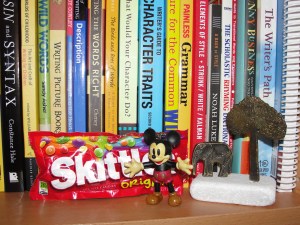 Do you know the feeling when something wonderful is brewing? Something that will lead you to the heart of a story that you thought had promise, but the potential was yet to be discovered?
Do you know the feeling when something wonderful is brewing? Something that will lead you to the heart of a story that you thought had promise, but the potential was yet to be discovered?
These past two months, writing has helped me grieve the recent loss of my father. I refrained from blogging to focus on my work. I even forced myself to rise earlier than the sun each morning, so that I could write in peace. Not a small feat if you know me well. Having to get out of bed early and assure that my two daughters were awake for school was torture to me.
Now I am writing well before the sun first appears for up to four hours, undisturbed–except for our yellow tabby that slyly inches across my writing couch and thinks I don’t notice his paw reaching over to my laptop until he plops halfway across my body and the keyboard.
I scoot Joey away and write whatever comes to mind. Or welcome new voices that have popped up in the recent days, or revisit an unfinished manuscript. (In the past month, I have written two picture books without thinking about them ahead of time. In a way, they wrote themselves, one morning between my first cup of coffee and lunch.)
In this same vein, my younger middle-grade protagonist, E. B. Louise, returned to my world one morning at 5:45 am. Still curled beneath my covers, I was not ready for fall mornings, when it is too cold to get out of bed because the heat has not yet kicked in, and the thought of having to race across a wood floor in bare feet to use the bathroom made me shiver. I decided to test the strength of my bladder and stay beneath the comforter.
E. B. Louise started to yak, yak, yak at me, and then it felt like a heavy encyclopedia had been dropped on my head.
“You know,” she said, while I was rubbing the not-real swelling knot on my forehead, my covers pulled up to my chin. “You are not paying attention to me and I need to finish my story.”
 Let me tell you, if my dad were still alive, I would have called him for advice–right that very moment, even though he was not a morning person. (His daily writing routine took him way into the late hours of the night.)
Let me tell you, if my dad were still alive, I would have called him for advice–right that very moment, even though he was not a morning person. (His daily writing routine took him way into the late hours of the night.)
“I’m stuck,” I said, pulling the covers over my head.
“Get unstuck.”
“Can’t you see that I am sleeping?”
“Makes no difference to me,” said E. B. Louise.
As much as I love the darn kid, she does not give up. I think this makes me love her even more.
I slipped on a fuzzy bathrobe, poured myself a cup of coffee, and then planted my bum in my writing chair. While my computer warmed up, I watched a bird peck at the corner of my window. Peck. Peck. Peck. With the E. B. Louise document open, I stared at the words.
Nothing happened.
 I glanced up at my dad’s Pinocchio collection that now sits on the top shelf of my bookcase, and this is when the kid started to yak again, though she sounded like me.
I glanced up at my dad’s Pinocchio collection that now sits on the top shelf of my bookcase, and this is when the kid started to yak again, though she sounded like me.
“

By: Betsy Devany,
on 10/4/2011
Blog:
Betsy Devany's Blog
(
Login to Add to MyJacketFlap)
JacketFlap tags:
Add a tag
 When your father dies, life does not stop. Even though you want it to, because it feels like it should. Just long enough so you can find your breath and assimilate the phone call from a stranger—acting as nicely as they could—who tells you your father passed and that they are very sorry. You thank the person you’ve never met, hang up the phone and cry. Cry until you make yourself stop so you can call your sisters, your brother, your mother, and your children.
When your father dies, life does not stop. Even though you want it to, because it feels like it should. Just long enough so you can find your breath and assimilate the phone call from a stranger—acting as nicely as they could—who tells you your father passed and that they are very sorry. You thank the person you’ve never met, hang up the phone and cry. Cry until you make yourself stop so you can call your sisters, your brother, your mother, and your children.
No one answers their phone, not that it would make any difference because you might not hear them; inside your ears there is pounding and throbbing. Like a beating heart working overtime.
And really, how do you tell them? How do you tell them what you know? How do you tell them so they won’t hurt, like you are now?
You dial. Hit end. Hit redial. Hit end. Dial. Hit end. Redial. Pace. Dial again. Five minutes pass. Ten. Fifteen. Pounding in the ears. Busy signals. Voice mail messages. Pounding.
Then everything around you speeds up, and finally your youngest daughter answers her cell and the crying starts all over again and your words are inaudible, but she gets it. She gets it; she gets how much you want to take your granddaughter to school (it is your day to do so), but you can’t, even though you want to. So life will feel the same. Like nothing has changed.
Yet, with one phone call from a stranger, everything has changed.
You go into survival mode, drop your uneaten toast into the garbage, sip your cold coffee, spit it out, dial another number. Dial. Hit end. Redial. Hit end. Busy signals. Voice mail messages. Pounding, pounding, pounding.
 You decide to try your brother-in-law’s cell and it rings and rings, and when you are about to give up, he says “Hello.” After you tell him the news, there is silence and your ear throbs, throbs, throbs, and, “Yes,” he will find your sister, who is at school having an important conference with one of your nieces.
You decide to try your brother-in-law’s cell and it rings and rings, and when you are about to give up, he says “Hello.” After you tell him the news, there is silence and your ear throbs, throbs, throbs, and, “Yes,” he will find your sister, who is at school having an important conference with one of your nieces.
Life does not stop when a parent dies.
Now you try to reach your brother, your other sister, your daughter, who is expecting a baby—a great-grandchild who your father will not be around to see born, though he dreamed of the moment, as he dreamed of living long enough to hold a book in print, written by you.
Within the hour, your brother (in between flights) calls you. And you tell him, and it feels as if you have yanked away the ground beneath him and you are too far away to lift him to safety. That same unstable ground shakes beneath your feet, and you keep trying to reach the others, and soon, you do. All except your mother, because she made a promise the night before to visit your father early that morning, and when you call someone to look out the window to see if her car is still in the parking lot, the person notices her driving away.
She is on her way to visit your father not knowing he has died.
Quickly, so quickly, you and your siblings convene over the phone. Who can stop her? Who can we reach on a moment’s notice to intercept our mother? One sister calls the minister, who says, “Yes, I am on the way,” and gets off the phone, so she can hurry, hurry, hurry.
And then you wait. You wait for fifteen minutes, hoping and praying the minister will get to the assisted living in time. Twenty minutes pass, then thirty, and your body is shaking because you do not know what is happening in North Carolina.
Finally, your sister calls to tell you that the minister arrived just as your mom was parking the car, an
View Next 18 Posts
 Baking Day at Grandma’s is a picture book bundled in love, warmth, and thoughtfulness. At its core, it speaks to a family (grandma and her grand cubs) spending quality time together. Not only is Anika Denise’s text a pitch-perfect rhyme—and one that makes you want to clap along (and bake a cake) with the charming bears—Christopher Denise’s illustrations are enchanting. The cover, with light streaming in through the kitchen window, immediately pulls you into the scene. You want to join the bear family, stir batter, sip hot cocoa on a snowy day, and dance to an old-fashioned record player while chocolate cake bakes, all in the company of a loving and adoring grandma bear, who happens to be modeled after Anika’s grandmother Rose. This is the highlight for me, and why Baking Day at Grandma’s is quickly becoming a favorite with my grandkids. The book even includes a recipe for Grandma Rose’s chocolate cake!
Baking Day at Grandma’s is a picture book bundled in love, warmth, and thoughtfulness. At its core, it speaks to a family (grandma and her grand cubs) spending quality time together. Not only is Anika Denise’s text a pitch-perfect rhyme—and one that makes you want to clap along (and bake a cake) with the charming bears—Christopher Denise’s illustrations are enchanting. The cover, with light streaming in through the kitchen window, immediately pulls you into the scene. You want to join the bear family, stir batter, sip hot cocoa on a snowy day, and dance to an old-fashioned record player while chocolate cake bakes, all in the company of a loving and adoring grandma bear, who happens to be modeled after Anika’s grandmother Rose. This is the highlight for me, and why Baking Day at Grandma’s is quickly becoming a favorite with my grandkids. The book even includes a recipe for Grandma Rose’s chocolate cake! I get emotional over heartfelt picture books, and Baking Day at Grandma’s is one of those books. It’s a perfect text-to-illustration match. The singsong rhythm of Anika’s words, coupled with bears that take on humanlike qualities in their movement and expressions, make this a picture book winner. A true talent of NYT’s bestselling illustrator Christopher Denise is how he brings woodland animals to life. They almost feel real. Clearly, these bears adore each other, and the artwork of their hellos and goodbyes is especially heartwarming. To learn more about how Baking Day at Grandma’s evolved, watch this endearing book trailer. https://www.youtube.com/watch?v=aZTRFELt9-0 Anika also offers a little Activity Kit on her website. Download for free here: http://www.anikadenise.com/free-goodies/
I get emotional over heartfelt picture books, and Baking Day at Grandma’s is one of those books. It’s a perfect text-to-illustration match. The singsong rhythm of Anika’s words, coupled with bears that take on humanlike qualities in their movement and expressions, make this a picture book winner. A true talent of NYT’s bestselling illustrator Christopher Denise is how he brings woodland animals to life. They almost feel real. Clearly, these bears adore each other, and the artwork of their hellos and goodbyes is especially heartwarming. To learn more about how Baking Day at Grandma’s evolved, watch this endearing book trailer. https://www.youtube.com/watch?v=aZTRFELt9-0 Anika also offers a little Activity Kit on her website. Download for free here: http://www.anikadenise.com/free-goodies/ The Providence Journal recently featured Anika and Christopher in a lovely must-read article. Learn more about this talented duo by clicking on the link. http://www.providencejournal.com/writers/gail-ciampa/20141001-charming-book-by-barrington-couple-has-its-heart-in-the-kitchen.ece
The Providence Journal recently featured Anika and Christopher in a lovely must-read article. Learn more about this talented duo by clicking on the link. http://www.providencejournal.com/writers/gail-ciampa/20141001-charming-book-by-barrington-couple-has-its-heart-in-the-kitchen.ece As someone who works at an old-fashioned toy store, I see a lot of grandparents. Too often, they arrive at Mystic’s Toy Soldier clutching detailed Christmas or Hanukkah lists, the I-only-want-this-specific-electronic-toy/game kind of list. I see the frustration and stress that comes along with this. Ultimately, we have lost the true meaning of holidays. Long lists of electronic games only encourage further isolation, and that is not what kids need. They need one-on-one attention. They need the TV off, electronic devices put away in drawers, and they need present adults without a cell phone at the ready. Children need to bake cakes and dance in the kitchen with their grandmas, or with their mothers, their fathers, and their grandfathers. With the support and encouragement of loved ones, children also need to know they can make a difference in this world by doing things for others. In Baking Day at Grandma’s, the bear cubs wrap up individual pieces of cake to give away as gifts. They do get to lick batter off the wooden spoon, which is always been my favorite part of cake baking.
As someone who works at an old-fashioned toy store, I see a lot of grandparents. Too often, they arrive at Mystic’s Toy Soldier clutching detailed Christmas or Hanukkah lists, the I-only-want-this-specific-electronic-toy/game kind of list. I see the frustration and stress that comes along with this. Ultimately, we have lost the true meaning of holidays. Long lists of electronic games only encourage further isolation, and that is not what kids need. They need one-on-one attention. They need the TV off, electronic devices put away in drawers, and they need present adults without a cell phone at the ready. Children need to bake cakes and dance in the kitchen with their grandmas, or with their mothers, their fathers, and their grandfathers. With the support and encouragement of loved ones, children also need to know they can make a difference in this world by doing things for others. In Baking Day at Grandma’s, the bear cubs wrap up individual pieces of cake to give away as gifts. They do get to lick batter off the wooden spoon, which is always been my favorite part of cake baking. Anika and Christopher Denise are some of the nicest people I know. And this weekend, at the Connecticut Children’s Book Fair, you can meet both of them! In addition to giving a joint presentation, Anika and Chris will also be signing copies of their collaborated books, which include Pigs Love Potatoes, and Bella and Stella Come Home. I could go on and on about why I love these books, too. In addition, Christopher has illustrated a multitude of books by other authors, including Rosemary Wells, and Brian Jacques.
Anika and Christopher Denise are some of the nicest people I know. And this weekend, at the Connecticut Children’s Book Fair, you can meet both of them! In addition to giving a joint presentation, Anika and Chris will also be signing copies of their collaborated books, which include Pigs Love Potatoes, and Bella and Stella Come Home. I could go on and on about why I love these books, too. In addition, Christopher has illustrated a multitude of books by other authors, including Rosemary Wells, and Brian Jacques.




























































 More months than I would have hoped for have passed since my last blog post. It’s not as if I haven’t been writing. I have. For hours on end. At this time in my life, the work I do on my novels bears more importance because ultimately, I want to leave something behind on this earth. Something beautiful. Whether it be through published works, photographs, or inspiring the children I encounter on a daily basis, that is where my main focus remains. Still, I enjoy blogging, so I am jumping back in with hopes that I can resume a more regular routine. Thank you for bearing with me.
More months than I would have hoped for have passed since my last blog post. It’s not as if I haven’t been writing. I have. For hours on end. At this time in my life, the work I do on my novels bears more importance because ultimately, I want to leave something behind on this earth. Something beautiful. Whether it be through published works, photographs, or inspiring the children I encounter on a daily basis, that is where my main focus remains. Still, I enjoy blogging, so I am jumping back in with hopes that I can resume a more regular routine. Thank you for bearing with me.















































I couldn’t agree more! Wrap up this book with a spoon, bowl and oven mitt for a delightful gift pack. Those grandkids will never miss that electronic doo-dad!
This is a lovely blog entry, Betsy. I especially agree with your conclusion about ways we become isolated and miss the joy of human interaction. I don’t think there’s anything sadder than a child sitting in a room with a parent or grandparent — both on their individual electronic devices.
As for a favorite memory … I have many. One involves baking with my oldest granddaughter … and watching her surprise when she succeeded (after a few failures) in breaking an egg into a bowl. I just wish you’d been there to capture her triumph with your camera!
I can’t wait to check this book out. My Grandmother was a saint, but she wasn’t a baker or a cook. I do remember that she whipped up her own whipped creme to put on her special bakery bought pies. She was a gem. Thanks for reminding me.
Unfortunately I do not have baking skills, but what I love more than anything is snuggling with books and my grandchildren. I was a teacher of young children for 33 years and reading them the beautiful classics was also the best part of my career. The Baking Day book looks beautiful!
I can’t wait to get Baking Day at Grandma’s. I had wonderful times with my grandmas. Now I am making memories with my grandsons. Thanks for reminding me of those precious times.
Yes, Cathy! Great idea.
I love your memory, Sally! I’ll have to take pictures of Landon and Ava breaking eggs into a bowl. Thanks for sharing.
Homemade whipped cream is the best, as is a gem of a grandmother. Thanks for sharing your memory!
Thank you for being a teacher, Vicki!
Snuggling with books and grandchildren is as magical as baking with them. I am so happy to hear that you shared beautiful classics with your kids.
Aren’t grandsons fun! I love mine.
Thanks for stopping by, Ali, and keep making those wonderful memories. Kids remember the quality time you spend with them.